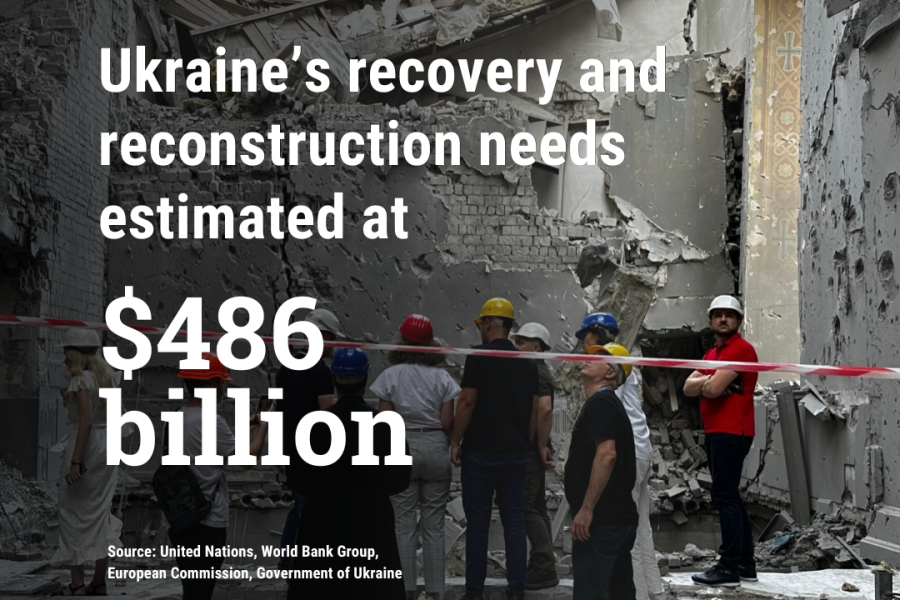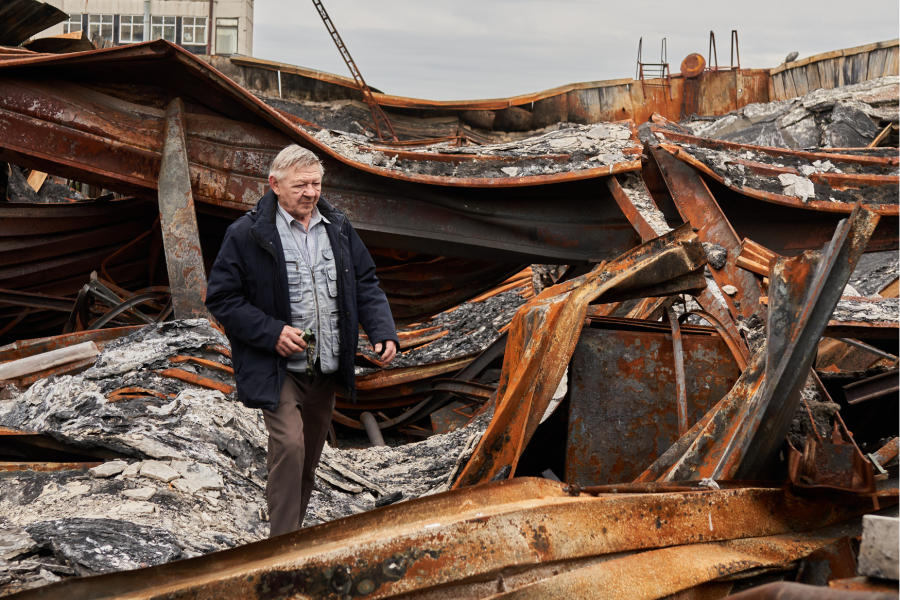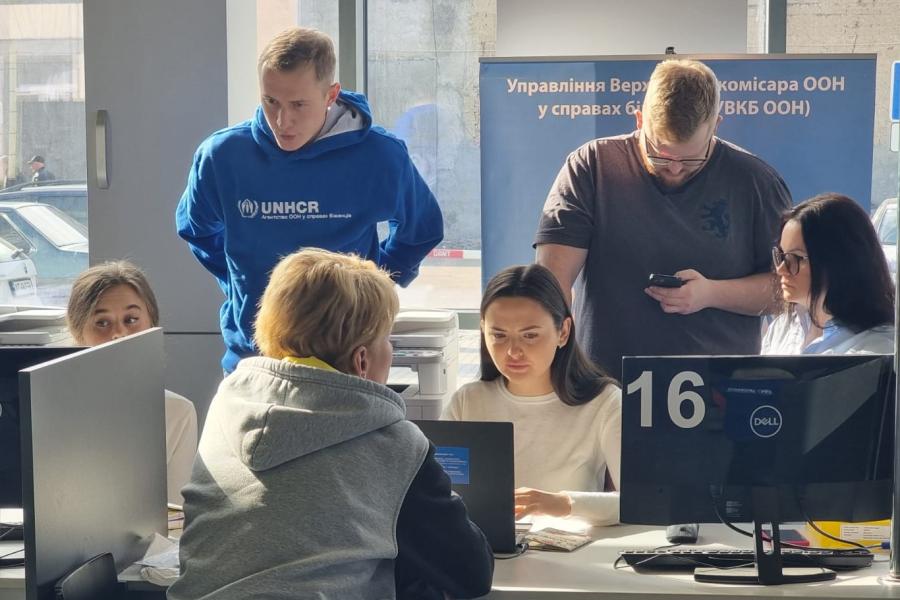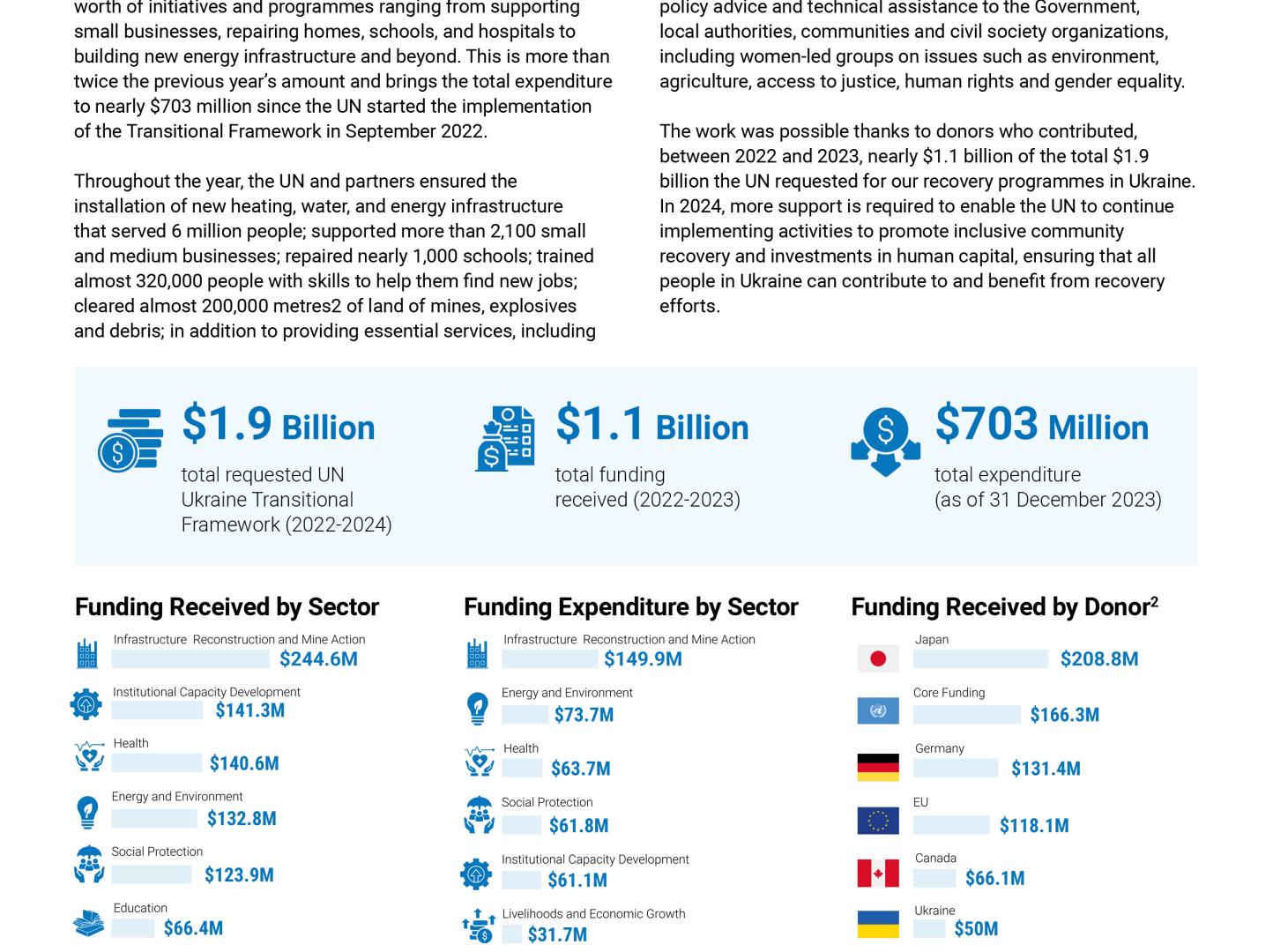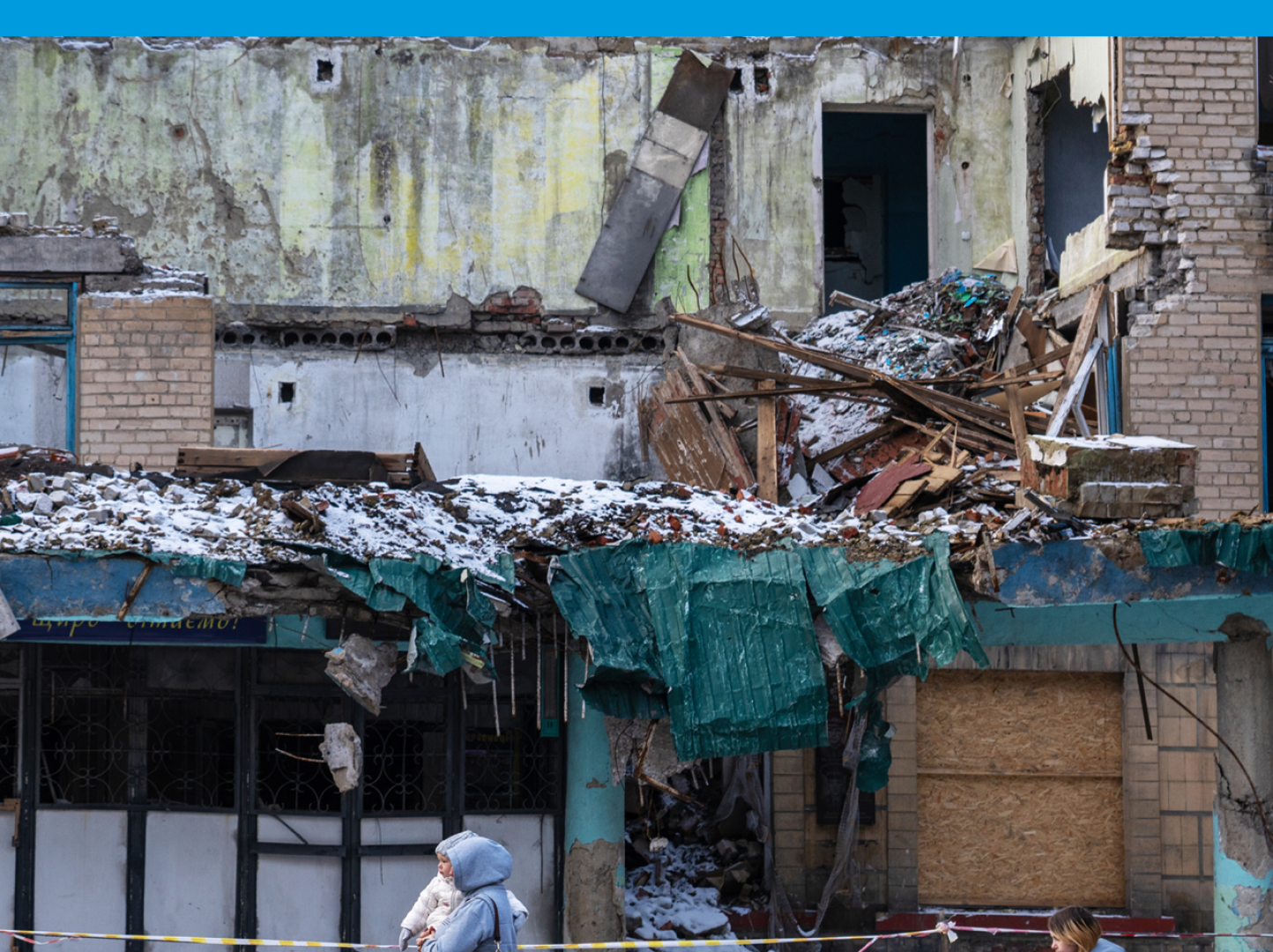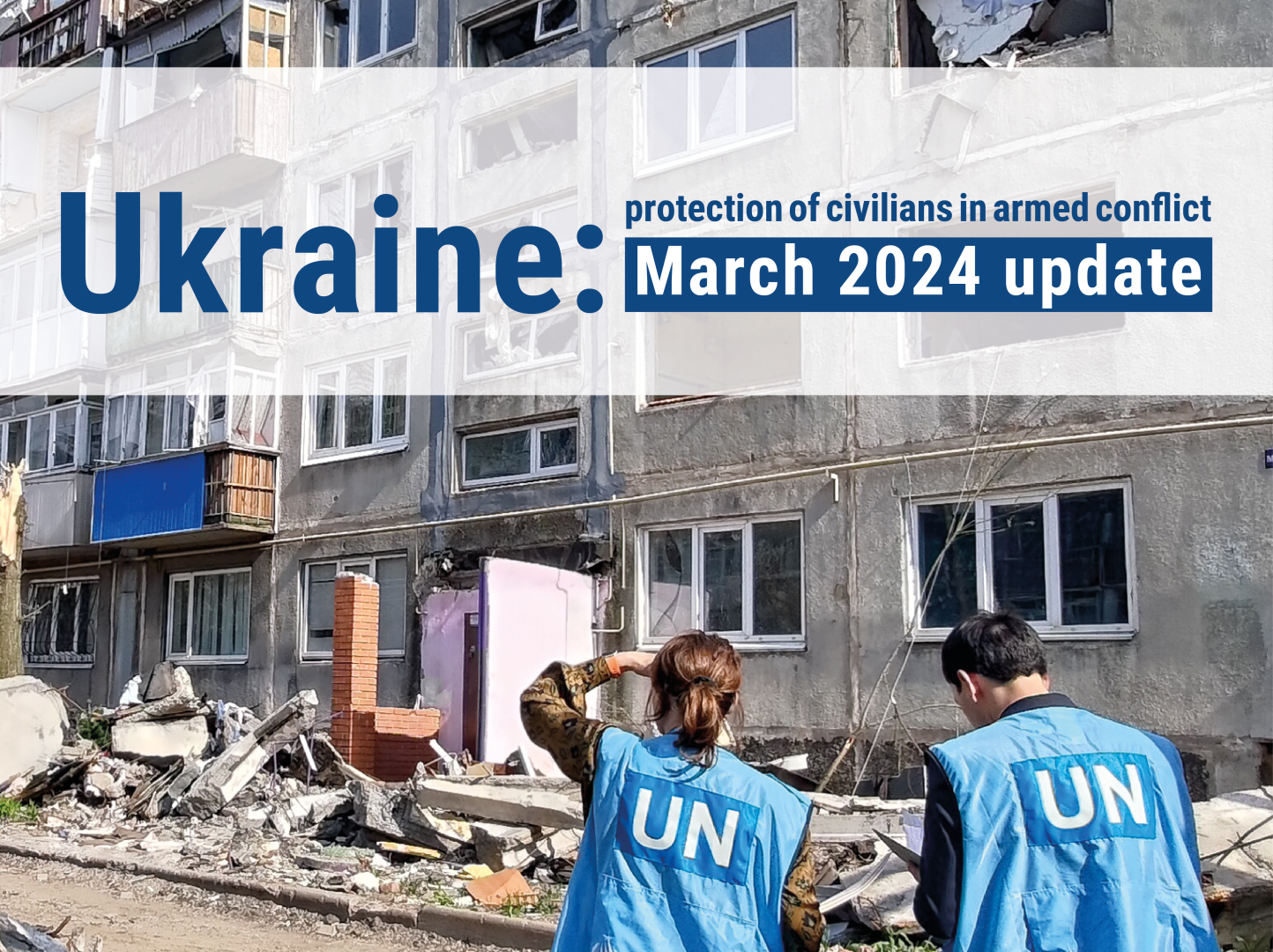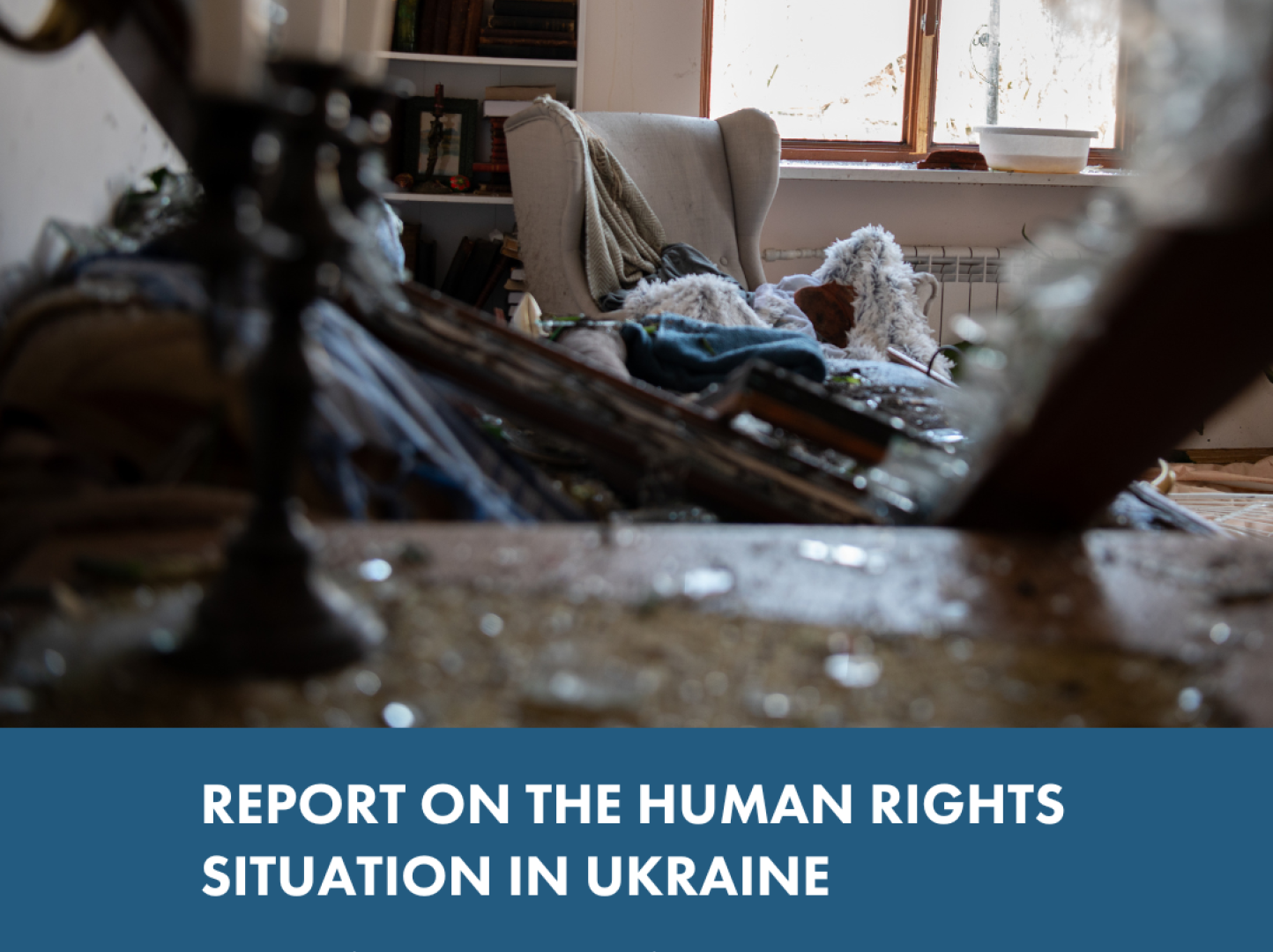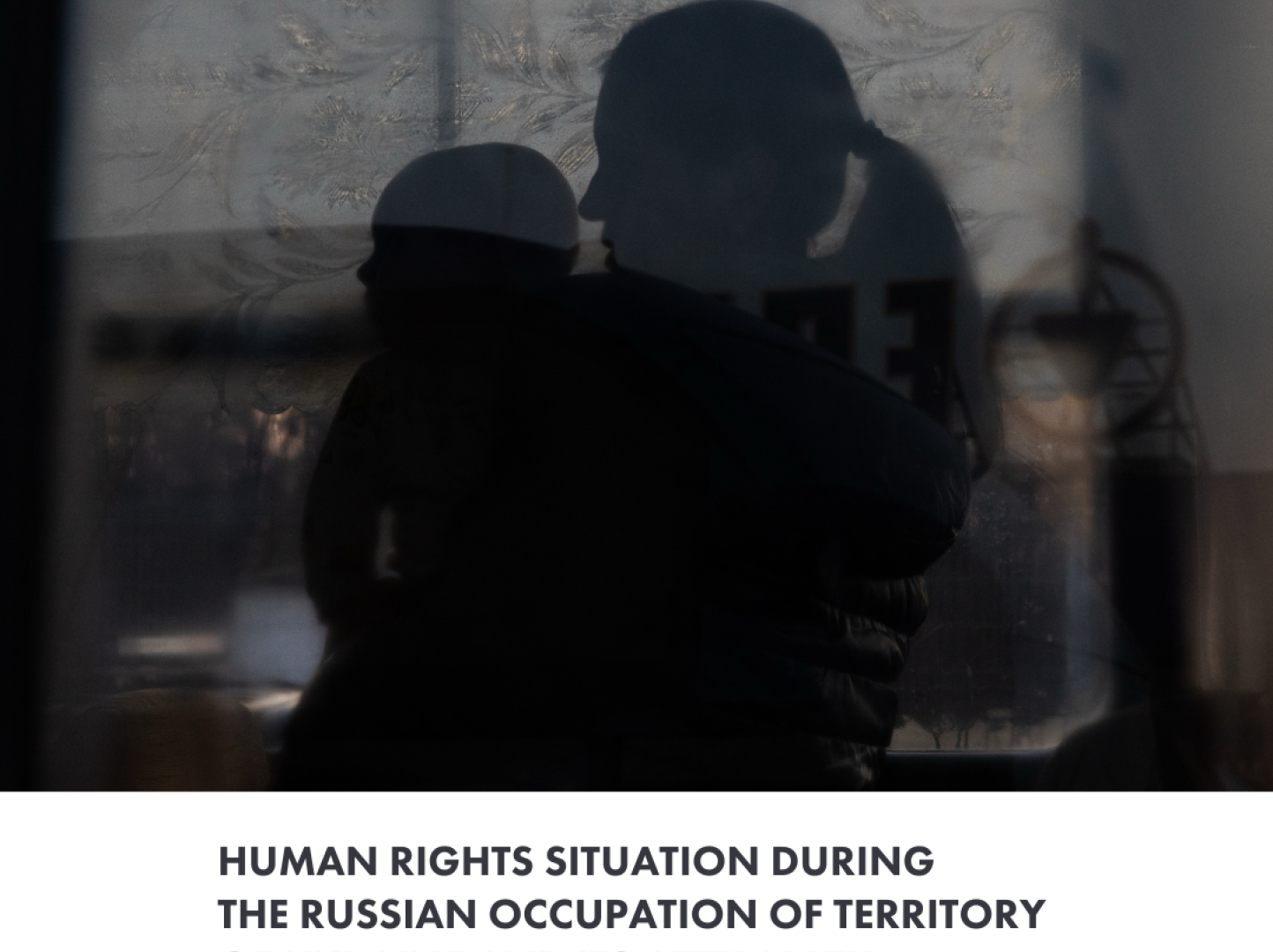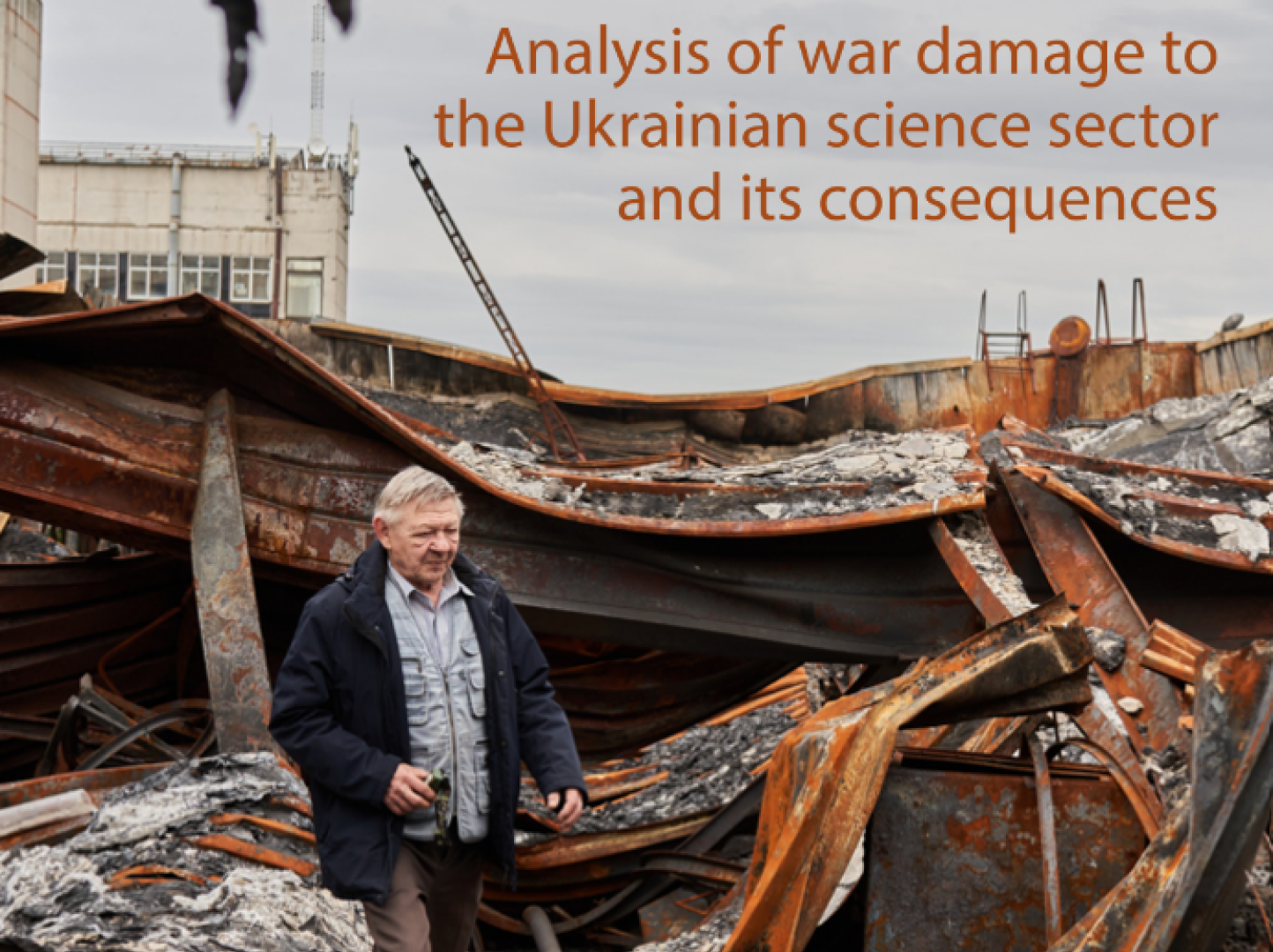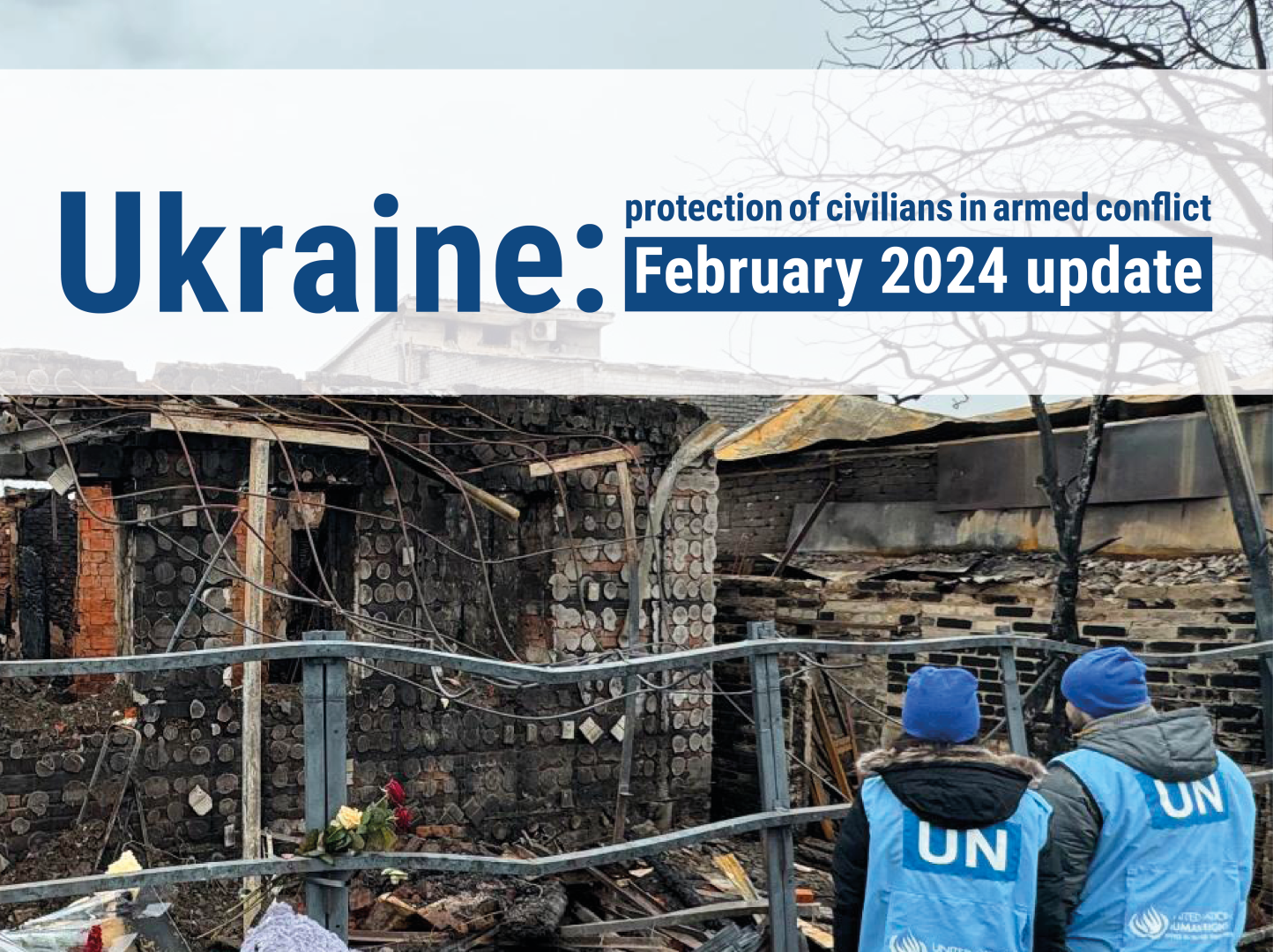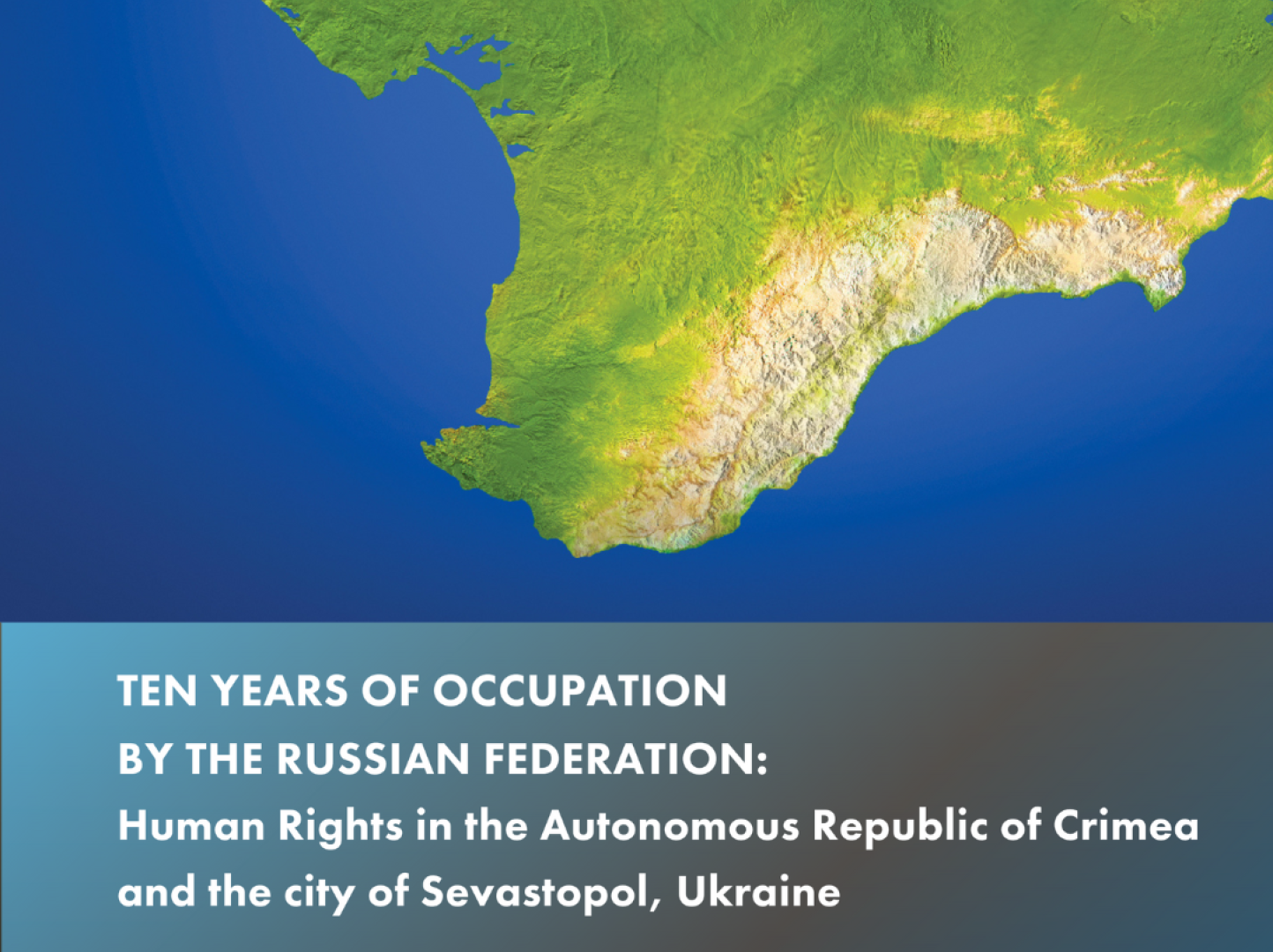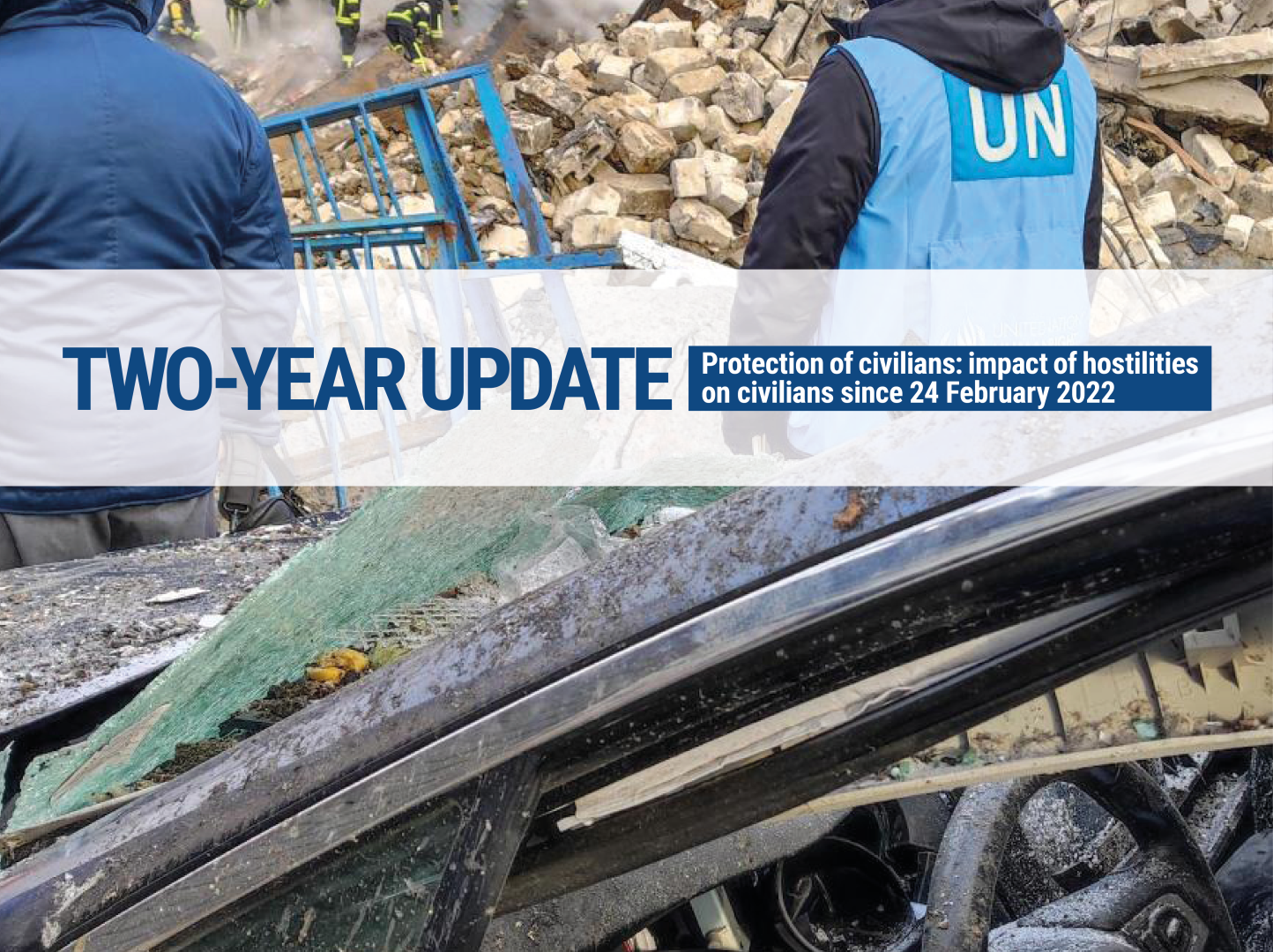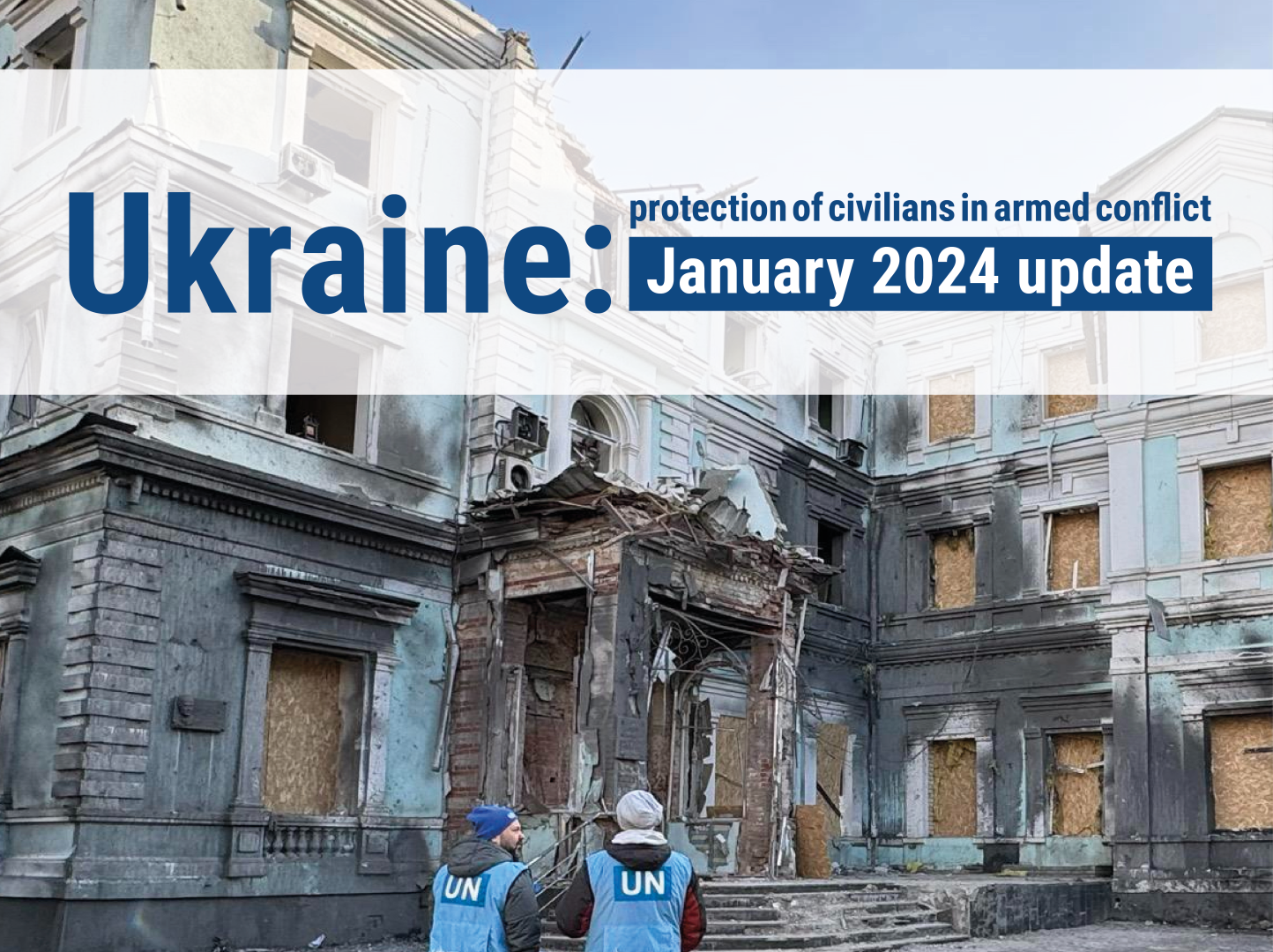Latest
Press Release
25 April 2024
The Head of the UN in Ukraine, Denise Brown, meets in Kyiv the Minister for Foreign Trade and Development of Finland, Ville Tavio
Learn more
Press Release
19 April 2024
THERE IS NO PEACEFUL MORNING IN UKRAINE
Learn more
Press Release
15 April 2024
SAUDI ARABIA SUPPORTS 140,000 UKRAINIANS WITH HOT MEALS THROUGH THE UN WORLD FOOD PROGRAMME
Learn more
Latest
The Sustainable Development Goals in Ukraine
The Sustainable Development Goals (SDGs) are a global call to action to end poverty, protect the earth’s environment and climate, and ensure that people everywhere can enjoy peace and prosperity. These are the goals the UN is working on in Ukraine:
Publication
15 April 2024
Annual Recovery Results Report 2023 - United Nations in Ukraine
- Foreword by the Resident Coordinator - In the third year of the full-scale Russia’s invasion, the
scourge of war is still bringing untold suffering and sorrow
to the people of Ukraine. The invasion, launched in violation
of the UN Charter and international law, has left thousands
of civilians killed and injured, caused massive destruction of
infrastructure, including hundreds of thousands of homes,
hospitals and schools, and deeply traumatized people regardless
of proximity to the front line. The war has shattered
the Ukrainian economy; rolling back development gains
made over the past years and plunging nearly 25 per cent
of people into poverty.The people of Ukraine are taking upon themselves the
monumental task to recover from the devastation caused
by the invasion. With remarkable and inspiring determination,
and no matter if they are close to the front line or in
communities where they have found safety and security,
Ukrainians are supporting one another to ensure their
communities are functioning, small shops are running,
schools are repaired and rebuilt with shelters so children
can attend in-person, hospitals and clinics reconstructed,
roads and bridges repaired and agricultural land and critical
and social infrastructure demined.The UN, the humanitarian community and our development
partners continue to work non-stop to ensure people enduring
the horrors of the war receive the support they need to
address their most immediate needs and also create the
conditions for their recovery. In 2023, more than 11 million
people received life-saving humanitarian assistance. This
achievement was made possible thanks to the efforts
of over 500 organizations – nearly 70 per cent of them
Ukrainian NGOs - our close collaboration with the authorities,
and the timely support of our donors.We have also scaled up our efforts to support recovery, with
more and more activities that provide people with durable
solutions and ensure they can get back on their feet. The UN
made significant contributions to Ukraine’s journey towards
a prosperous future: supporting strong data collection and
analysis to inform recovery priorities – including the third
Rapid Damage and Needs Assessment (RDNA) and the
Post-Disaster Needs Assessment (PDNA) of the Kakhovka
Dam’s destruction; creating platforms to engage communities
in the decision-making and forums to bring together
Government, donors and civil society; supporting small
businesses; repairing vital infrastructure; and contributing
to demining efforts and beyond.The UN –our 3,000 employees and 24 agencies – is determined
to continue supporting the Government’s recovery
priorities with investments in Ukraine’s communities, human
capital and national systems, and ensure recovery takes
into consideration the specific needs of women, people
with disabilities and marginalized groups.
Despite the progress, these efforts are not enough to stop
the suffering and devastating consequences of Russia’s
invasion of Ukraine. The world – and the international
community – cannot accept war as the new reality. Living
under constant bombardment, constant fear, is not normal.
For this reason, war as a state of existence for people in
Ukraine, must not be normalized. Every effort must continue
towards a just peace in line with the UN Charter.
Denise Brown
Resident Coordinator
United Nations in Ukraine
scourge of war is still bringing untold suffering and sorrow
to the people of Ukraine. The invasion, launched in violation
of the UN Charter and international law, has left thousands
of civilians killed and injured, caused massive destruction of
infrastructure, including hundreds of thousands of homes,
hospitals and schools, and deeply traumatized people regardless
of proximity to the front line. The war has shattered
the Ukrainian economy; rolling back development gains
made over the past years and plunging nearly 25 per cent
of people into poverty.The people of Ukraine are taking upon themselves the
monumental task to recover from the devastation caused
by the invasion. With remarkable and inspiring determination,
and no matter if they are close to the front line or in
communities where they have found safety and security,
Ukrainians are supporting one another to ensure their
communities are functioning, small shops are running,
schools are repaired and rebuilt with shelters so children
can attend in-person, hospitals and clinics reconstructed,
roads and bridges repaired and agricultural land and critical
and social infrastructure demined.The UN, the humanitarian community and our development
partners continue to work non-stop to ensure people enduring
the horrors of the war receive the support they need to
address their most immediate needs and also create the
conditions for their recovery. In 2023, more than 11 million
people received life-saving humanitarian assistance. This
achievement was made possible thanks to the efforts
of over 500 organizations – nearly 70 per cent of them
Ukrainian NGOs - our close collaboration with the authorities,
and the timely support of our donors.We have also scaled up our efforts to support recovery, with
more and more activities that provide people with durable
solutions and ensure they can get back on their feet. The UN
made significant contributions to Ukraine’s journey towards
a prosperous future: supporting strong data collection and
analysis to inform recovery priorities – including the third
Rapid Damage and Needs Assessment (RDNA) and the
Post-Disaster Needs Assessment (PDNA) of the Kakhovka
Dam’s destruction; creating platforms to engage communities
in the decision-making and forums to bring together
Government, donors and civil society; supporting small
businesses; repairing vital infrastructure; and contributing
to demining efforts and beyond.The UN –our 3,000 employees and 24 agencies – is determined
to continue supporting the Government’s recovery
priorities with investments in Ukraine’s communities, human
capital and national systems, and ensure recovery takes
into consideration the specific needs of women, people
with disabilities and marginalized groups.
Despite the progress, these efforts are not enough to stop
the suffering and devastating consequences of Russia’s
invasion of Ukraine. The world – and the international
community – cannot accept war as the new reality. Living
under constant bombardment, constant fear, is not normal.
For this reason, war as a state of existence for people in
Ukraine, must not be normalized. Every effort must continue
towards a just peace in line with the UN Charter.
Denise Brown
Resident Coordinator
United Nations in Ukraine
1 of 5
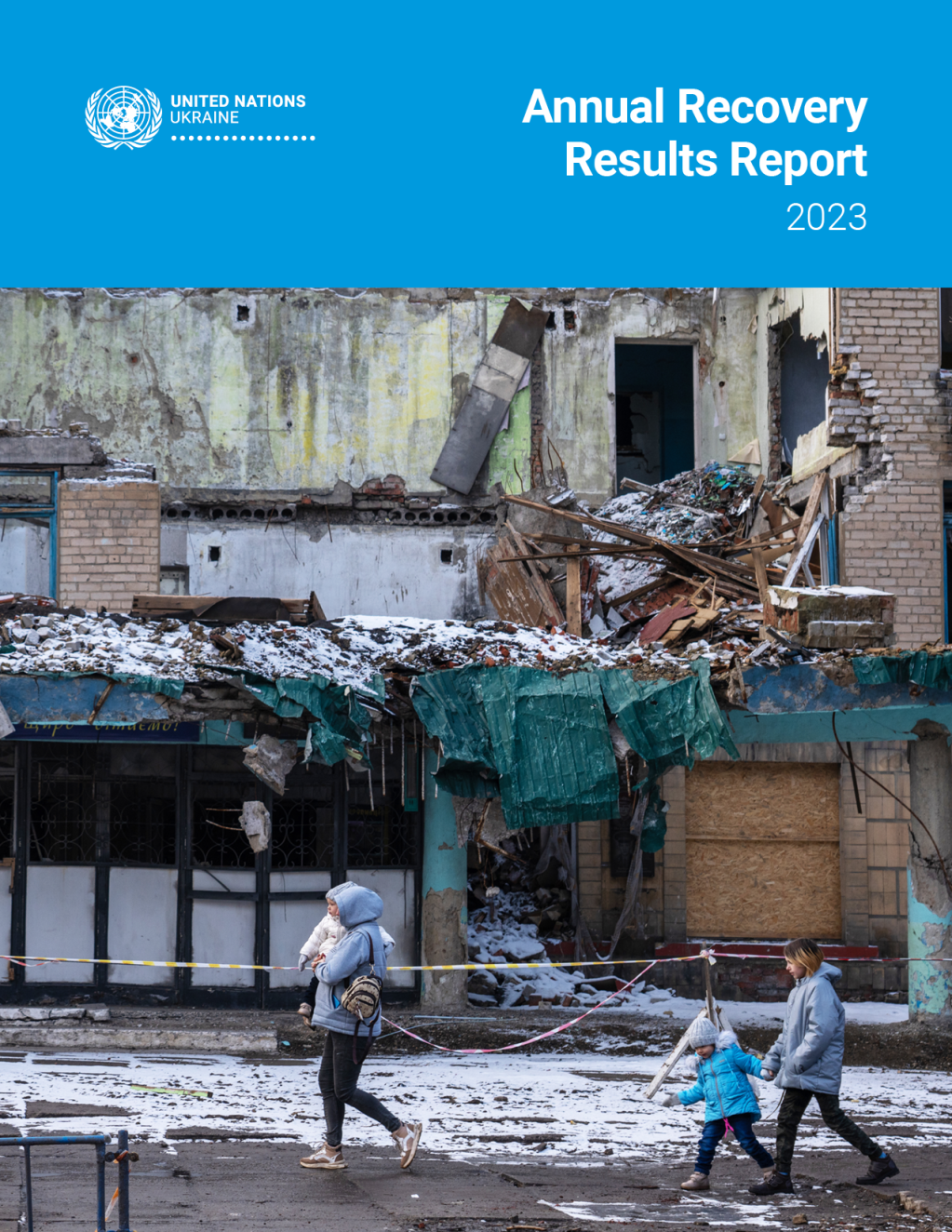
Press Release
07 March 2024
UN Resident Coordinator in Ukraine, Denise Brown, message for the International Women’s Day
THEY INSPIRE ME
The women of Ukraine, their determination, have truly inspired and encouraged me since the day I arrived in this country. In each and every one of my many travels across Ukraine, whether it is to a war-torn community close to the front line or a town in the West where people fleeing the horrors of Russia’s invasion sought refuge, I see and hear stories of determination, hope and solidarity led by strong Ukrainian women. I am a witness to the fact that women in Ukraine – at all levels – refuse to give up and are relentless in their work to promote a better future for their country. I have been inspired by women in leadership positions, both at the national Government and local level, like the women representatives I met in front-line towns like Kherson, Mylove or Orikhiv, who spare no effort and overcome tremendous challenges to bring some relief to their communities torn apart by the war. It motivates me to see that women are the backbone of the humanitarian response and work non-stop to help their communities under extreme hardship, like the doctor I met in Siversk, in the Donetsk Region. Despite all the risks, she decided to stay there, fearing not the bombs and missiles but the fact that it would be, otherwise, almost impossible for people in her community to access health care. I met so many mothers who had to learn how to support their children who could no longer go to school, at the same time as, with compassion, caring for the sick, the disabled, the elderly and filling the gaps left by a social system massively disrupted by the war.I met in Kramatorsk, Kharkiv and Uzhhorod so many fierce and inspiring women leading organizations and movements advocating for the rights of the people of Ukraine, and striving to ensure no one is left behind, particularly the most vulnerable, including people with disabilities, the Roma or LGBTQIA+ community. And again, they are taking up these massive challenges at a time when they face higher levels of unemployment, a larger and persistent gender pay gap, heightened risk of gender-based violence and obstacles to accessing essential services.Women are as important at the decision-making tables as they are at the frontlines of their communities. For this reason, the UN is committed to continuing our efforts to support them and create platforms at different levels to ensure women have a leading role in Ukraine’s economic and social recovery.
The women of Ukraine, their determination, have truly inspired and encouraged me since the day I arrived in this country. In each and every one of my many travels across Ukraine, whether it is to a war-torn community close to the front line or a town in the West where people fleeing the horrors of Russia’s invasion sought refuge, I see and hear stories of determination, hope and solidarity led by strong Ukrainian women. I am a witness to the fact that women in Ukraine – at all levels – refuse to give up and are relentless in their work to promote a better future for their country. I have been inspired by women in leadership positions, both at the national Government and local level, like the women representatives I met in front-line towns like Kherson, Mylove or Orikhiv, who spare no effort and overcome tremendous challenges to bring some relief to their communities torn apart by the war. It motivates me to see that women are the backbone of the humanitarian response and work non-stop to help their communities under extreme hardship, like the doctor I met in Siversk, in the Donetsk Region. Despite all the risks, she decided to stay there, fearing not the bombs and missiles but the fact that it would be, otherwise, almost impossible for people in her community to access health care. I met so many mothers who had to learn how to support their children who could no longer go to school, at the same time as, with compassion, caring for the sick, the disabled, the elderly and filling the gaps left by a social system massively disrupted by the war.I met in Kramatorsk, Kharkiv and Uzhhorod so many fierce and inspiring women leading organizations and movements advocating for the rights of the people of Ukraine, and striving to ensure no one is left behind, particularly the most vulnerable, including people with disabilities, the Roma or LGBTQIA+ community. And again, they are taking up these massive challenges at a time when they face higher levels of unemployment, a larger and persistent gender pay gap, heightened risk of gender-based violence and obstacles to accessing essential services.Women are as important at the decision-making tables as they are at the frontlines of their communities. For this reason, the UN is committed to continuing our efforts to support them and create platforms at different levels to ensure women have a leading role in Ukraine’s economic and social recovery.
1 of 5
Speech
15 February 2024
Remarks by the Head of the UN in Ukraine, Denise Brown, during the launch of the third Rapid Damage and Needs Assessment
I stood here in exact same spot last year when we launched the RDNA2, with the same actors, the Prime Minister of Ukraine, the European Union and the World Bank.
I was thinking this morning about what I said then, and I made the point that no one wants to live in a collective centre. People want to return home, be in their communities, send their kids to school, have easy access to health care, and walk down the street to the market. And mainly live without the fear and trauma that war creates.
What I said one year ago is still true and we see it every day: Ukrainians are determined to return to their lives pre-war with their eyes on the future.
That is a big challenge for the 4.5 million internally displaced persons in Ukraine and the 5.9 million people who fled across borders to seek safety and refuge in Europe.
Missile strikes in communities along the front line and beyond, as we saw this morning, including here in Kyiv, almost every day, make that recovery a challenge. The reality is, and I see it all the time, that displacement and collective centres remain an unfortunate reality for millions of Ukrainians. Hospitals, schools, and ports continue to be attacked, damaged and destroyed.
And, I think most horrifically, civilians killed, injured and maimed, including children, which is what we saw yesterday again in the Donetsk Region.
I know the RDNA3 reports it – the UN contributed, there is a great partnership with the Government, the European Union and the World Bank – and I also have what I know from my missions throughout the country that, for the moment – and it is in the report but hasn’t been mentioned yet – humanitarian assistance and recovery are going to have to co-exist for quite some time. And our challenge is linking one to the other.
Humanitarian assistance remains a lifeline for millions of Ukrainians who, because of the war, as I said many times already, can't yet go home or those who remain in their homes along the front-line communities because their life has no meaning anywhere else. And despite their daily struggles, what I heard so many times from those people is that their life has purpose and their life has dignity, no matter how difficult it is.
I really want to emphasize that the Government, the United Nations, the international and national NGOs, local volunteers, the regional and local authorities, we have created a vast network that allow us to respond when a missile strikes a community, for the displaced to provide them with daily support, for the disabled… And in the report you will heart that the number of disabled in the country has grown over 7 per cent since we launched the RDNA 2. And the support for the elderly. So that network provides this assistance.
In Bilozerka, where I was about 10 days ago, and in Kherson, where I was this past Monday, people continue to depend on that assistance. So, the reality is that, again, humanitarian assistance and recovery have to co-exist.
And I really want to thank the donors because your support allowed us collectively to provide 11 million people with assistance in 2023.
But what is that vital step beyond humanitarian assistance, where possible?
For the UN, and in the report this year, you will really see the focus is community recovery.
In Izium, in Mykolaiv, in Sumy, and outside of Kyiv in Ivankiv, the people and the authorities are now well positioned, the conditions are in place to move beyond humanitarian assistance, and take back their lives.
Based on the leadership of local authorities, based on community-determined priorities, civil society engagement, the inclusion of women – not just inclusion of women but inclusion as decision-makers –, the disabled – again whose numbers have grown – and minority communities such as the Roma – I was in Uzhhorod last week and spent some time with them – so when the conditions are there, including security, recovery is taking place.
Social services have been re-established; schools built with bunkers – we heard that 90 per cent of children are registered, not necessarily attending but registered for schools –; hospitals and clinics reconstructed; roads and bridges repaired; agricultural land and critical social infrastructure demined; and small businesses reopened, and many of those small ones are women-owned.
This will have to happen community by community. And the numbers in the report, as you will hear and see when we have the presentation, those are very big numbers, a little bit overwhelming.
But the restoring back is really going to take place in the communities.
I was thinking about Mykolaiv. When I first was there in September 2022, there was no electricity, the water tasted like salt, and most of the people had left. I was there this past weekend, and it is a city that can be lived in now and people have returned.
The RDNA 3 is the documentation of the damage and needs that drives national prioritization and the financial mechanisms. But this year, in that report, we are also focusing on recovery and the human capital.
Behind the numbers is the critical need to ensure that Ukraine has the people with the right skills and capacity to take back their lives, and recover – across the country, not just in part of the country – what was lost.
I just want to finish by saying that the war is fought by the people of Ukraine.
The impact of the war is felt every single day by the people of Ukraine.
And the recovery of the country will depend on the people of Ukraine, with our support. And while we are not pleased that we have to have another RDNA, as Gevorg said, at least we have a document that will drive the priorities, determine the financial requirements, and allow us, all the partners, to align behind the common objectives.
Thank you very much.
***
For more information, refer to the Press Release.
***
For more information, refer to the Press Release.
1 of 5
Press Release
28 February 2024
Russian Federation’s decade-long occupation of Crimea marked by widespread violations
In a report issued today, HRMMU said the Russian Federation has unlawfully imposed its citizenship, laws, and institutions on Crimea’s population across all spheres of life, suppressing opposition and dissent. The report cites examples of steps taken by the Russian Federation to restrict the civic space and limit fundamental freedoms. Crimean Tatar leaders, perceived as opposing the occupation of Crimea or the Russian Federation policies, were among those particularly affected by the measures. While Crimean Tatars, who fled the peninsula in the wake of the illegal annexation, have been barred from returning to their homeland, many Russians have been resettled in Crimea, in an apparent attempt to change the peninsula’s demographic structure. Large-scale expropriations of public and private property have been implemented without compensation or regard for international law.“Over the past decade, we have documented efforts by the Russian Federation to impose the Russian language, culture, and institutional framework on Crimea while at the same time taking actions to erase the peninsula’s rich cultural, linguistic, and religious heritage,” said the head of HRMMU, Danielle Bell.The report says opposition to the efforts by the Russian Federation to consolidate its hold on Crimea has been met with harsh reprisals. Individuals who opposed or challenged the occupation were subjected to human rights violations, including enforced disappearance, arbitrary detention, torture and ill-treatment. HRMMU says it documented 104 cases of enforced disappearance and 55 cases of torture affecting pro-Ukrainian activists, journalists and Crimean Tatars.The occupying authorities in Crimea have suppressed freedom of expression, including the expressions of minority cultures and identities, and severely curtailed the freedom of religion of minority groups, particularly those opposing official narratives, the report said.“Our findings on the human rights situation in Crimea, which has endured Russian occupation for more than a decade now, are not only alarming but they are also a grim harbinger of the devastating and lasting impact Russian occupation may have on other occupied regions of Ukraine,” said Bell.
1 of 5
Story
19 February 2024
Aid workers go the extra mile for Oleksandr
"I desperately needed simple things – to do shopping, to cook food, to maintain hygiene. I also needed surgery that couldn't be performed in our town." In October 2023, Oleksandr suffered an injury unrelated to the war that rendered him almost immobile and in need of urgent hip replacement surgery. However, the ongoing war in Ukraine, particularly fierce in the south and east, had disrupted local service providers, including health facilities and public transport. Residents with a disability, trauma or illness were in a dire situation, unable to access essential services.
"The relentless hostilities in areas close to the front lines, particularly in the east and the south of the country, have severely affected civilian infrastructure and disrupted public transportation," says Yevhen Kaplin, Head of Humanitarian Mission Proliska. “Social transport is a lifeline.”
Humanitarian Mission Proliska is just one of the many humanitarian organizations that stepped in after recognizing the urgent need for assistance in regions devastated by the war. It offers social transportation services – a lifeline for people stranded in front-line towns.
"I was referred to the humanitarian organization [Humanitarian Mission Proliska],” Oleksandr explains, a glimmer of hope in his voice.
This referral marked a turning point in his quest for aid. Within a few days, he was on his way to Uzhhorod, located 1,200 km to the west of Ukraine, to receive proper medical care and support.
Proliska has offered social transport services since 2022, with support from the OCHA-managed Humanitarian Fund for Ukraine. It helped Oleksandr in every way possible.
For example, when he needed blood during surgery, the organization’s staff donated their blood without hesitation. "The blood was urgently needed for an older person, so I made the decision to contribute. If one can easily help, why not?” explains Proliska staff member Artem Bakalo. “Moreover, I have experience as a blood donor and frequently donate, especially given the ongoing war and the high demand for surgeries." Since Russia’s full-scale invasion in February 2022, protection partners have provided evacuation and social transportation support to about 1.2 million people. In 2023, they assisted more than 170,000 people – 60 per cent of whom were older people and people with disabilities.
For example, when he needed blood during surgery, the organization’s staff donated their blood without hesitation. "The blood was urgently needed for an older person, so I made the decision to contribute. If one can easily help, why not?” explains Proliska staff member Artem Bakalo. “Moreover, I have experience as a blood donor and frequently donate, especially given the ongoing war and the high demand for surgeries." Since Russia’s full-scale invasion in February 2022, protection partners have provided evacuation and social transportation support to about 1.2 million people. In 2023, they assisted more than 170,000 people – 60 per cent of whom were older people and people with disabilities.
1 of 5
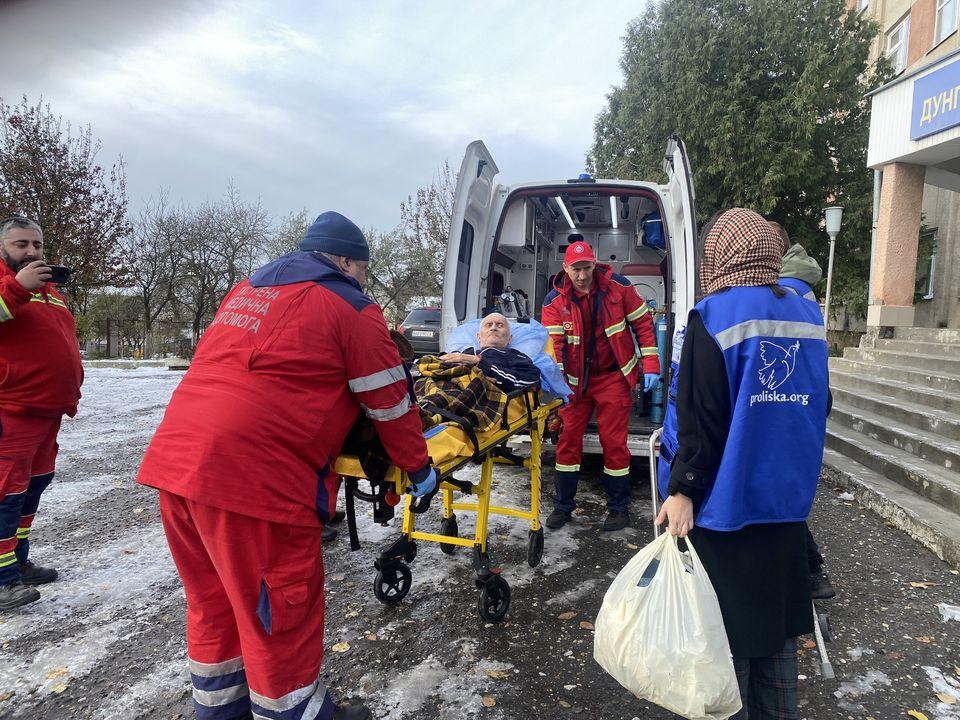
Story
04 April 2024
War in Ukraine: How a demining project is bringing hope to farmers two years on
By Niema Abdelmageed, Antoine Vallas and Elizabeth BryantWinter has cast an icy grip over the eastern Ukrainian village of Kamianka. But not so long ago, residents Volodymyr Korniich and his wife Liudmyla would have been looking ahead to spring planting. Over nearly a quarter century, the couple has slowly expanded their farming business, growing a mix of grains, vegetables and watermelon, and raising chickens, cows and pigs. But today, their work has ground to a halt. Not because of the harsh weather, but because of landmines. “In this village, we can only feel safe in our own yard,” says Korniich. “When you go outside, there is danger waiting for you.”As Ukraine enters its third year of war, the country has outstripped Afghanistan and Syria to become the most heavily mined in the world. Roughly 25,000 sq km of agricultural land are potentially strewn with mines and other dangerous debris from the conflict, which have so far killed and maimed hundreds of people. Beyond the risk to human lives, landmines are threatening this agricultural powerhouse that has long been a top grain exporter, contributing to pushing up global grain prices – and poverty. Smallholder farmers like Korniich – responsible for the vast majority of milk, cattle, fruit and vegetable production in the country and accounting for three-quarters of its food-producing labour force – are especially threatened. Many have halted or reduced their production, and almost all are surviving on dwindling revenues. But today, a small section of Korniich’s land has been cleared, thanks to a joint demining project run by the World Food Programme (WFP) and the Food and Agricultural Organization of the United Nations (FAO), with support from the Geneva-based NGO Fondation Suisse de Déminage. Focusing on smallholders like Korniich who cultivate less than 300 hectares of land – along with rural families growing crops for their own consumption – the programme is initially being rolled out in the eastern Kharkiv region, with plans to expand to two of Ukraine’s other top farming regions, Mykolaiv and Kherson. “By restoring mined land to productive use, we can help restore agricultural livelihoods – and, in doing so, phase out the need for humanitarian assistance for thousands of rural families,” says Marianne Ward, WFP Ukraine Country Director ad interim. More jobs, new hopesThe WFP-FAO demining project is being carried out in close cooperation with rural communities and the Ukrainian authorities, as part of a broader government effort to clear vast swathes of contaminated land. The goal and the price tag are daunting: the World Bank estimates the cost could exceed $US37 billion. But demining also brings major financial returns. The smallholder-focused project alone could potentially save up to US$60 million in direct food assistance to rural communities – like those living in Kamianka – who struggle to afford food and other basic necessities. “Demining will ensure access to land for many families who cultivate crops for their own consumption, but also for farmers who sell their produce for a living,” says Maselskiy Ivanovych, who heads the Izium local administration that includes Kamianka. “This can provide jobs, but also increase the budget of territorial communities in the district.”The WFP-FAO project uses satellite imagery to map out potentially mined land, then dispatches specialized teams to survey and clear it – prioritizing productive areas that can be quickly and safely restored. FAO also assesses specific needs of households and offers financial assistance to participants left destitute by the war.“This is an opportunity to save those villages in Ukraine that are devastated and destroyed and return a breath of life to them,” says Nina Yarosh, WFP Programme Policy Officer in Kharkiv. In Kamianka, many of Korniich’s neighbours have left the village for safer places. Others have become war casualties. “We have people who were wounded,” he says, “people without hope. And people who already lost hope that it would ever be safe to walk here.”Those who remain are living with dwindling resources. Korniich’s family lives without heat, electricity or gas. One of his three farm labourers left. Yet today, friends and neighbours displaced by the war are calling him to ask about the progress of the demining, eager to return. “They told me, ‘Volodia, I will be cultivating, I will rebuild here. I don’t want to leave anymore',” he says. Another local farmer, Tetiiana Lukianko, was evacuated from Kamianka early into the war. She returned home last March. “I found two grenades in my cellar, one in the yard, and one more in the flower garden,” she says. Lukianko is also on the list for the WFP-FAO demining project. Despite the ongoing conflict, she is hopeful about the future. “I believe the village will revive,” she says. “It’s a very beautiful village.” WFP’s mine action project to restore rural livelihoods in Ukraine is funded by Croatia, the Czech Republic, the European Union, Finland, France, Norway, Poland, Private donors and the Ukraine Humanitarian Fund (UHF).
1 of 5
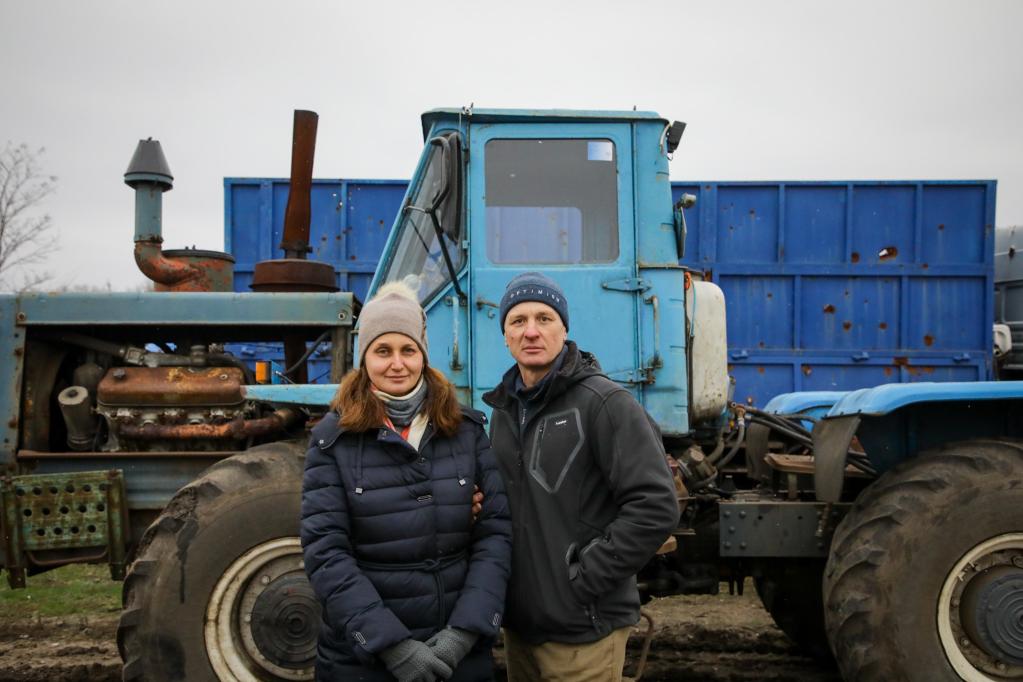
Story
14 March 2024
Hot meals and bomb shelters: In Ukraine, wartime school meals offer nourishment and security
It’s 10:15 am at Velyka Mykhailivka’s primary school, in Ukraine’s southern Odesa region, where around 100 young faces aged six to ten are lining up at the canteen to receive their daily meal. The smell of pea soup wafting from the kitchen makes it hard to stay still and respect teachers’ orders to wash hands before sitting down. Over the past week, this village has witnessed seven air raid alarms lasting nearly eight hours in total. The surrounding area borders the sea, which is constantly contested. Port infrastructure has been repeatedly targeted by missiles, while attacks on cities and villages are also very common. Residents take the air raid alerts seriously. Each time they sound means rockets or drones carrying explosive charges are approaching. Despite the danger, approximately 6,000 people reside in the village. This lyceum is one of 700 schools supported by the World Food Programme’s (WFP) school feeding programme, which helps provide daily nutritious meals to 100,000 children in Ukraine. Besides the pea soup, today’s school menu offers pasta with meat. The children also receive compote (a drink made from fresh or frozen fruits or berries) and bananas. One meal at this school this year would have cost $1.29 (50 hryvnias) per day. Accordingly, a month of meals for one child would have cost approximately $26. That’s a hefty sum for struggling families in Ukraine, where the minimum salary is the equivalent of $US185. “It’s hard to explain to little children why someone goes to lunch and someone doesn’t,” says maths teacher Natalia Kravchenko, the school’s principal. “This especially applies to children from disadvantaged or poor families … whose parents cannot afford to pay for meals.“So we’re very glad,” she adds, “that our school participates in the World Food Programme’s school feeding initiative.”Kravchenko has been managing this school for 18 years. She has known it for much longer. She started as a first grade pupil in 1977, when the school first opened. Her main goal during the war has been to maintain as normal a life as possible for the children. During air alarms, the students are taken to a shelter in the school’s basement. But the basement cannot accommodate all students at once, so Kravchenko decided to split classes into two shifts to keep everyone safe: elementary school pupils start at 8 a.m.; their high school peers begin at 11:30 a.m. The latter are divided into two groups, alternating between in-person and remote learning every week. Maria, a first grader, has already finished her pea soup – her favorite dish – while Dasha, her classmate, tells us she prefers the pasta. Roman, Maria’s father, works as a sports coach at the school. Finding jobs in the village is tough. There are few businesses – or plans for any new ones– because of the uncertainty of the war and regular air raids. So most job opportunities are found in public institutions like schools, hospitals, and the village council. “Both my wife and I have jobs,” he says – Maria’s mum, Yaroslava, works at another school.“But we are the lucky ones,” adds Roman. “There are children whose parents cannot afford to buy them a banana, an orange, or an apple.” Managing children’s school schedules is a complicated juggling act for parents - made more complicated by the conflict. Six-year-old Dasha wakes up at 6:30 a.m, her mother Oksana says, leaving little time to give her breakfast. “One child is in elementary school, the other in high school, and I also have a job,” Oksana adds. “Sometimes, I come home, and I ask her, ‘Dasha, will you eat?’ and she says, ‘No, I already ate at school, they have such delicious cutlets and fish there!’ And I understand that my child is eating healthy food at school, while I’m saving a significant portion of the family budget.” The WFP school meals programme covers 30 percent of the cost of daily hot meals for children in grades 1-4. This helps to ease the financial burden on parents, especially those who are barely scraping by.In February, thanks to WFP support, a hot meal at this school costs students’ families only 16 kopiykas — far less than a single US penny. With cheaper lunches, 125 pupils are now eating at the canteen, compared to 90 at the start of the year.The daily meals also bring a much-needed sense of routine, stability, and normalcy in this time of war. Many of the school’s pupils and their families were displaced by the fighting. They are rebuilding lives here that could again fall apart at a moment’s notice.“If it weren't for the war, we would already be planning for a second child,” says Maria's father, Roman. “But the situation here is complex. With Transnistria just 30km away, fighting could erupt at any moment. So, my car is always fueled, and our belongings are packed, just in case we need to flee.” Funding for WFP school feeding in Ukraine was provided by the French government, and Mastercard, WFP’s longstanding partner of 12 years. Mastercard has supported WFP’s efforts to provide school meals to vulnerable communities worldwide, and their early funding for school feeding in Ukraine has helped ensure that children like Maria and Dasha can receive a daily hot meal.
1 of 5
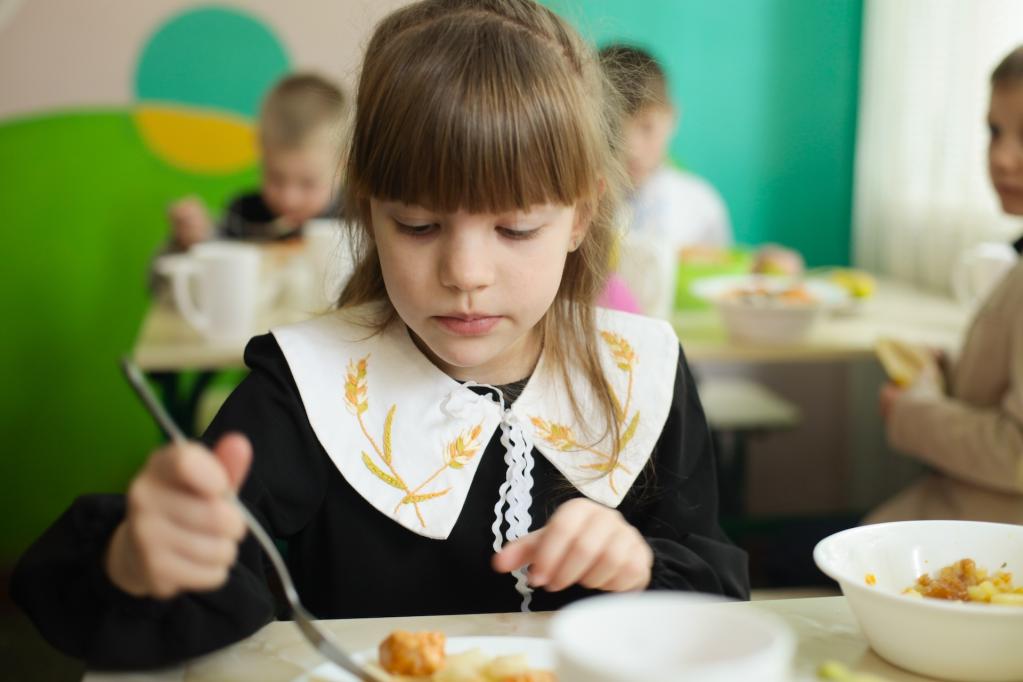
Story
11 March 2024
Ukraine: Restoring scientific infrastructure will cost over $1.26 billion (UNESCO)
The report reveals that 1,443 buildings and laboratories, as well as 750 pieces of scientific equipment, have been damaged or destroyed since the start of the war in February 2022. Ukraine’s scientific community has experienced significant setbacks and a drop in scientific funding.Read the full study here.As the situation becomes more and more critical for the scientific community, we must protect and support their research in Ukraine. Scientists, engineers and other experts will be essential to the country's recovery, not to mention what this sector represents as a valuable source of innovation and discovery for the rest of the world.Audrey AzoulayUNESCO Director-GeneralBefore the Russian invasion, Ukraine was internationally renowned for its important contributions to fields like Computer Science, Nuclear Physics and Astronomy. From 2015 to 2019, the total volume of scientific publications (excluding social sciences, arts and humanities) increased by 45%. In AI and Robotics alone, Ukraine produced 6,214 publications between 2012 and 2019 (UNESCO 2021 Science Report).According to the new study published today by UNESCO and the Junior Academy of Sciences of Ukraine, a total of 1,443 buildings belonging to 177 scientific institutions have been damaged or destroyed in the past two years. Restoring these buildings will cost more than $ 1.21 billion – including $ 980.5 million for universities alone as these have suffered the greatest losses. The Kharkiv region's scientific infrastructure has been the most severely affected, with the highest damage costs borne by the Yaroslav Mudryi National Law University ($ 116.5 million) and the O. M. Beketov National University of Urban Economy ($ 104.1 million). Much essential equipment has been destroyed or stolenIn addition to the buildings themselves, over 750 pieces of scientific and technical equipment have been damaged, with 643 items damaged beyond repair. This includes equipment used in a wide range of research activities. The total cost to restore this essential research equipment is estimated at $ 45.9 million.The temporary occupation of territories by Russian forces is also having a major impact: 18 scientific institutes have had to relocate, some of which were conducting studies on local biodiversity and ecology which cannot continue remotely. The situation around the Institute for Safety Problems of Nuclear Power Plants, near Zaporizhzhia, is of particular concern. Essential equipment for monitoring the state of the nuclear industry has been stolen or destroyed, including a unique radiological laboratory which controls radiation levels. The loss of this monitoring equipment represents a major security threat for the wider region. A significant setback for Ukraine’s scientific communityThe war has dispersed Ukrainian scientists across the country and even abroad, and their working conditions have deteriorated. In February 2022, the public research sector employed 88,629 researchers. Since then, 12% (10,429) of these researchers and professors from 524 institutions and universities have been forced to either relocate elsewhere within Ukraine (4,887) or abroad (5,542). Germany and Poland currently host the highest number of Ukrainian scientists in exile. The number of scientists employed by Ukraine’s public research sector has dropped by 4,958 (5,3%).About 30% of Ukraine’s scientists are now forced to work remotely. This includes both emigrants and internally displaced personnel, such those forced to flee areas most affected by the bombardments: Kharkiv, Kyiv, Sumy, Dnipro, Odesa and the Zaporizhzhia region. A growing lack of fundsFunding for science has also been significantly reduced. According to the UNESCO Institute for Statistics, gross domestic expenditure on research and development shrank by 38.5% between 2021 and 2022, from $ 2019.5 million to $1242.1 million.Since 2021, the National Academy of Sciences of Ukraine, representing 450 affiliated institutes, has seen a 48% reduction in its budget. This has forced the suspension of multiple research programmes and led to the weakening of many research groups and teams. Average monthly salaries have dropped by 39% and many researchers have been forced to work part-time.Over the past two years, the displacement of scientists and budget cuts have affected Ukraine’s scientific output, including publishing activity, as well as the level of collaboration with member states of the European Union, members of the Euro-Atlantic Partnership and countries in Africa and Asia. On 11 March, UNESCO is convening a meeting at its headquarters (Paris, France) at which scientists from Ukraine and beyond will discuss the study's findings with the Organization’s Member States, and consider the next steps in UNESCO's support for Ukraine.Read moreUNESCO’s “Analysis of War Damage to the Ukrainian Science Sector and its Conseq…
1 of 5
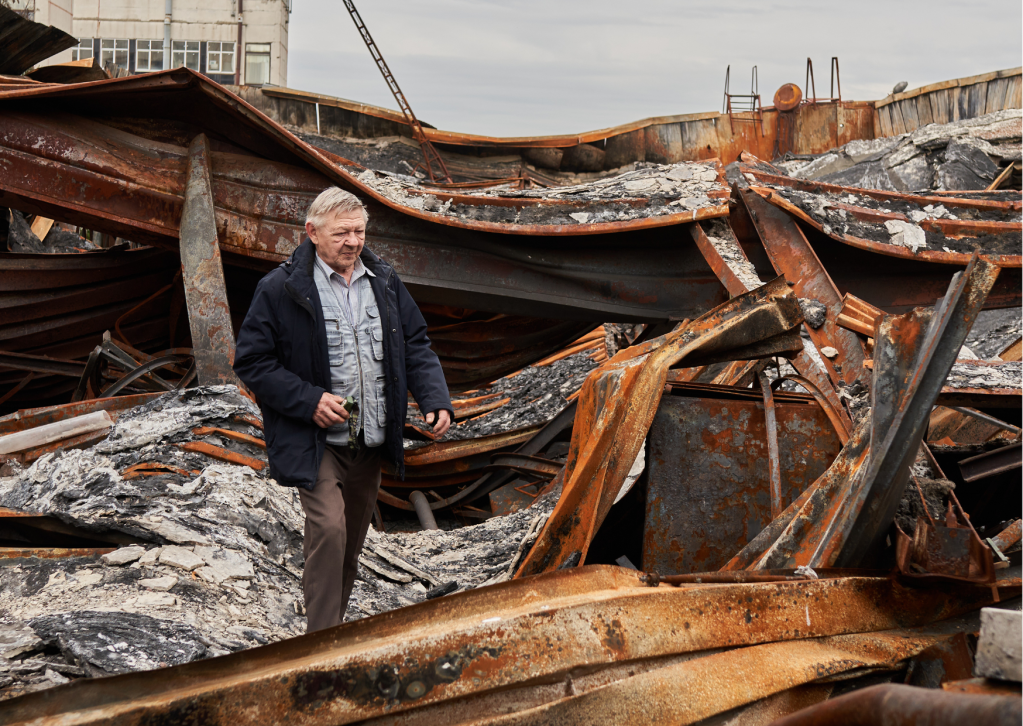
Story
15 February 2024
Updated Ukraine Recovery and Reconstruction Needs Assessment Released
After almost two years of Russia’s full-scale invasion of Ukraine, an updated joint Rapid Damage and Needs Assessment (RDNA3) released today by the Government of Ukraine, the World Bank Group, the European Commission, and the United Nations currently estimates that as of 31 December 2023 the total cost of reconstruction and recovery in Ukraine is $486 billion over the next decade, up from $411 billion estimated one year ago.
In 2024 alone, Ukrainian authorities estimate the country will need around $15 billion for immediate reconstruction and recovery priorities at both the national and community level, with a particular focus on supporting and mobilizing the private sector alongside restoration of housing, soft infrastructure and services, energy, and transport. The RDNA3 highlights that while some $5.5 billion of this funding has been secured, from both Ukraine’s international partners and its own resources, about $9.5 billion is currently unfunded.
"Despite the ongoing full-scale war, the Ukrainian government, with the support of international partners, continues to implement a rapid recovery program. The execution of the Third Rapid Damage and Needs Assessment (RDNA3) allows us to approach this process more systematically. We are grateful to the World Bank and other partners for this work," said Prime Minister of Ukraine Denys Shmyhal. "We see that the needs for reconstruction have continued to grow over the past year. The main resource for Ukraine's recovery should be the confiscation of Russian assets frozen in the West. We need to start this process already this year. Concurrently, the Ukrainian government is creating conditions to attract private investments, which will accelerate the reconstruction process and transform our country on its path to the EU."
Commissioner for Neighborhood and Enlargement Olivér Várhelyi said: “Russia’s war of aggression continues to have far-reaching consequences on Ukraine. The EU will continue to play a key role in addressing the short and medium-term challenges identified in today’s RDNA3 report. By making available the updated information, RDNA3 helps to further focus the recovery, reconstruction and modernization effort through Ukraine Facility and Ukraine Plan.”
The RDNA3, which covers damages incurred over a nearly two-year period from Russia’s invasion of Ukraine on February 24, 2022, to December 31, 2023, finds that direct damage in Ukraine has now reached almost $152 billion, with housing, transport, commerce and industry, energy, and agriculture as the most affected sectors. Damage is concentrated in the Donetska, Kharkivska, Luhanska, Zaporizka, Khersonska, and Kyivska oblasts which are the same regions that suffered the greatest damage as reported in the previous assessment.
Across the country, 10% of the housing stock has been damaged or destroyed, prolonging displacement of Ukrainians from their communities. The destruction of the Kakhovka Dam and the hydropower plant in June 2023 has resulted in significant negative impacts on the environment and agriculture and exacerbated challenges already faced by people struggling to access housing, water, food, and health services.
The RDNA3 lists critical investment needs for short-term recovery and medium-term reconstruction. Where possible, the assessment considers and excludes the needs that have already been met through the state budget and support provided by partners and the international community.
The RDNA3 also highlights the continued need for reforms and policies that catalyze private sector involvement and ensure an inclusive and green recovery, as well as integrating project planning into the medium-term budget planning process.
“The last two years have seen unprecedented suffering and loss for Ukraine and its people,” said Antonella Bassani, World Bank Vice President for Europe and Central Asia. “Yet, while this updated assessment documents the extensive damages and consequent needs, it is at the same time a testament to Ukraine’s resilience—demonstrating that the dedication and adaptability of its people have helped to already repair some of the damage and build towards recovery. As the Ukrainian authorities continue on their path towards economic recovery and ambitious reforms, we, the World Bank Group, remain deeply committed to working with them to secure a better future.”
The RDNA3 findings complement the priorities foreseen in reform and investment agenda of the Ukraine Plan that will lay the framework for implementing payments under the Ukraine Facility for the next four years by the EU. As Ukraine prepares for the EU accession process, these reforms and investments support the principles of “building back better” and the institutional capacity of national and subnational authorities.
Since the last assessment (RDNA2), the Government of Ukraine, with the support of its partners, has met some of the most urgent needs. For example, in the housing sector, according to the Government of Ukraine data, in 2023, $1 billion was disbursed toward housing sector recovery, with most being dedicated to the repair and reconstruction of damaged buildings. In the transport sector, more than 2,000km of emergency repairs were made on motorways, highways, and other national roads. In the education sector, local authorities rebuilt approximately 500 educational institutions and since January 2023, the share of educational institutions with bomb shelters has increased from 68% to 80%.
The RDNA3 also includes stronger data and analysis of the impact on vulnerable groups of people and on communities. It presents the case for investment in Ukraine’s human capital.
“The war is not over. The suffering is not over,” said Denise Brown, United Nations Resident Coordinator in Ukraine. “But communities in Ukraine are demonstrating significant courage and commitment in driving their own inclusive recovery processes and they need the continued support of their international partners. The future of Ukraine depends upon the people of Ukraine; this is where we need to invest.”
The overall costs reflected in the recovery and reconstruction figure of $486 billion—estimated over 10 years—include measures required for rebuilding for a modern, low-carbon, inclusive and climate-resilient future. The highest estimated recovery and reconstruction needs are in housing (17% of the total), followed by transport (15%), commerce and industry (14%), agriculture (12%), energy (10%), social protection and livelihoods (9%), and explosive hazard management (7%). Across all sectors, the cost of debris clearance and management (and demolition where needed) reached almost $11 billion.
***
1 of 5
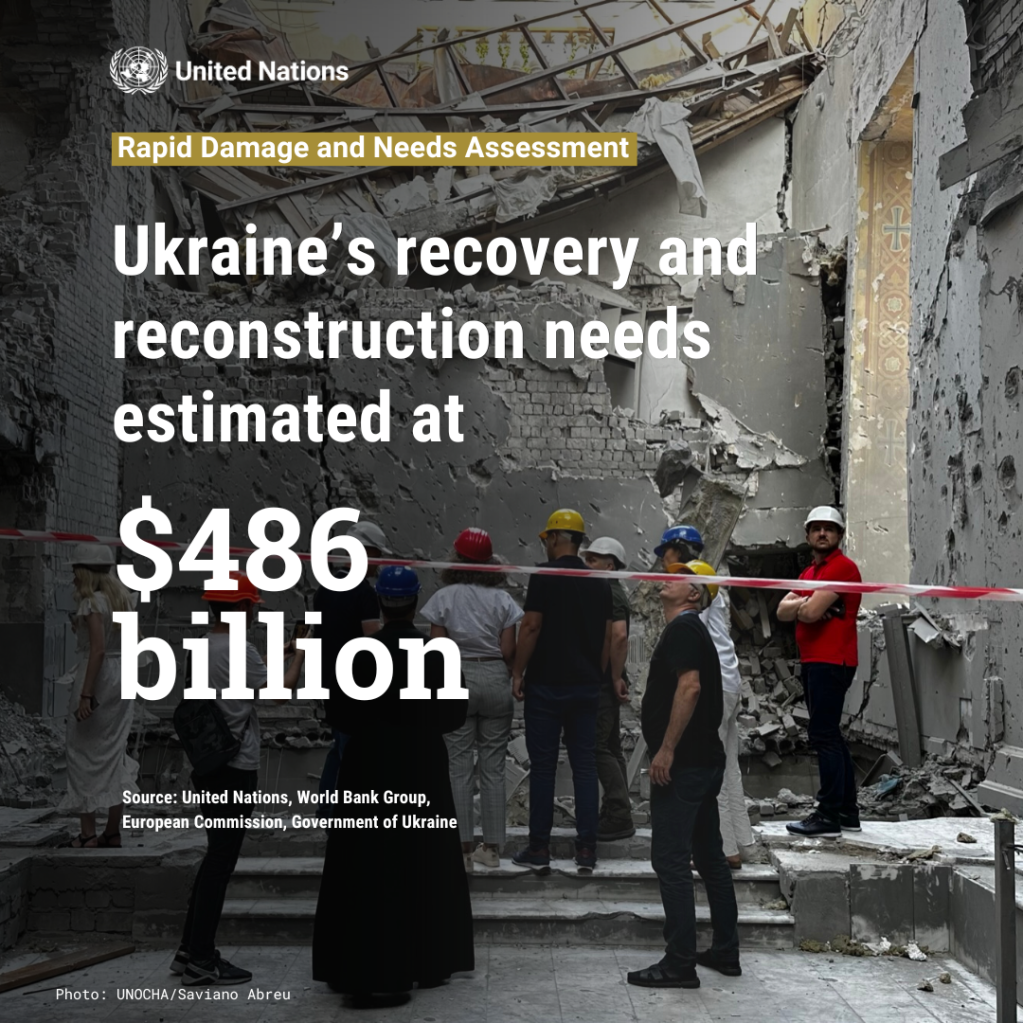
Story
06 February 2024
In a rare video contest, Ukrainians of all ages tackle human rights in the middle of war
"I saw a contest, and I thought that we have this situation in Ukraine, and why not show Ukrainians in this situation? Every person has a right to life," says the 11-year-old from Chernivtsi in Western Ukraine. Andriy, who dreams of becoming a video game developer in the future, was among the five winners of a video contest organized earlier this year by the United Nations Human Rights Monitoring Mission in Ukraine (HRMMU) to mark the 75th anniversary of the Universal Declaration of Human Rights (UDHR).
“The video contest aimed to encourage film makers to show how the UDHR can advance its promise of freedom, equality and justice for all,” says Danielle Bell who heads the UN’s Human Rights Monitoring Mission in Ukraine.
Bell‘s previous experience in war-ravaged Afghanistan and Iraq demonstrated how short films could be a powerful tool for digital storytelling. “The videos were powerful, conveying the intense emotions of people affected by the trauma and devastation of war, which profoundly impacts human rights,” she explains.
The UN contest drew 51 participants of all ages from all over Ukraine. Participants included a colorful mix of primary schoolers, university students, lecturers and activists. The three main contest winners were chosen by a public vote on the UN Monitoring Mission’s Instagram page. Two more prizes were awarded by a panel of UN staff. The winners came from Mykolaiv, Rivne, Chernivtsi and Khmelnytskiy regions of Ukraine.
Ruslana, a teacher at a media school for children in Rivne, says her students themselves decided on how best to approach the context. “It was really the kid’s idea,” she says, “they brainstormed on how to show human rights, they themselves came up with a script that focused on visiting places that they could no longer visit because of the war, and they also acted in it,” she says. The idea for the theme of the prize-winning video came from 13-year-old Vlad whose family had to flee the southern city of Kherson at the beginning of the war.
Oleksandr, a police school cadet and a student in Kamianets Podilskiy in south-western Ukraine, says he and his classmates, who produced another prize-winning video, decided to focus on human rights violations and war crimes committed since Russia invaded Ukraine 22 months ago. He argues that the filming as such was not very challenging, but the editing process was. “Still, these are positive emotions that everyone warmly remembers,” he says, despite the video’s grim topic.
Roman, a university lecturer and practicing journalist from Mykolaiv in southern Ukraine, notes that the topic chosen by his students—overwork—is currently relevant for many Ukrainians. With over three years of experience working for a local TV channel, Roman has extensive experience in creating videos. He reflects, “I've had many projects, but none like this one. The collaborative process of group scriptwriting, direction, and filming ignited a desire in me and provided motivation for my students.” He adds that they are planning to create videos on human rights issues. “Students need it for professional growth, and the country needs it to increase awareness of its citizens' rights,” Roman added.
“The topics highlighted in the videos address a wide range of human rights issues, such as the right to life, personal dignity, access to education, and more. Amid the suffering caused by this war, we hope that these narratives contribute to creating a more compassionate and informed global community,” says Bell noted.
The short video produced by Ruslan, a law student at the Chernivtsi National University, one of Ukraine’s oldest schools, tackles loss during the war. “Reflecting on the past and present, peacetime and wartime is a painful topic for most Ukrainians, including children whose parents are now fighting in the East and losing their lives,” he says. “The moment your father has not returned is really painful,” says Ruslan. “It hasn’t happened to me, but I hear such stories all the time.” He explains that making a video for the contest was an inspiring and eye-opening experience. He says he now wants to set up an NGO to protect the human rights of servicepersons.
Ruslana, the teacher from Rivne, says Ukraine’s soldiers serving on the frontline are also on her young students’ minds. She recalls that recently her students produced a video with a digital wish list for Santa Claus. They asked Santa to bring the fighters back safely, but in the meantime to make sure they had hot tea.
***
1 of 5
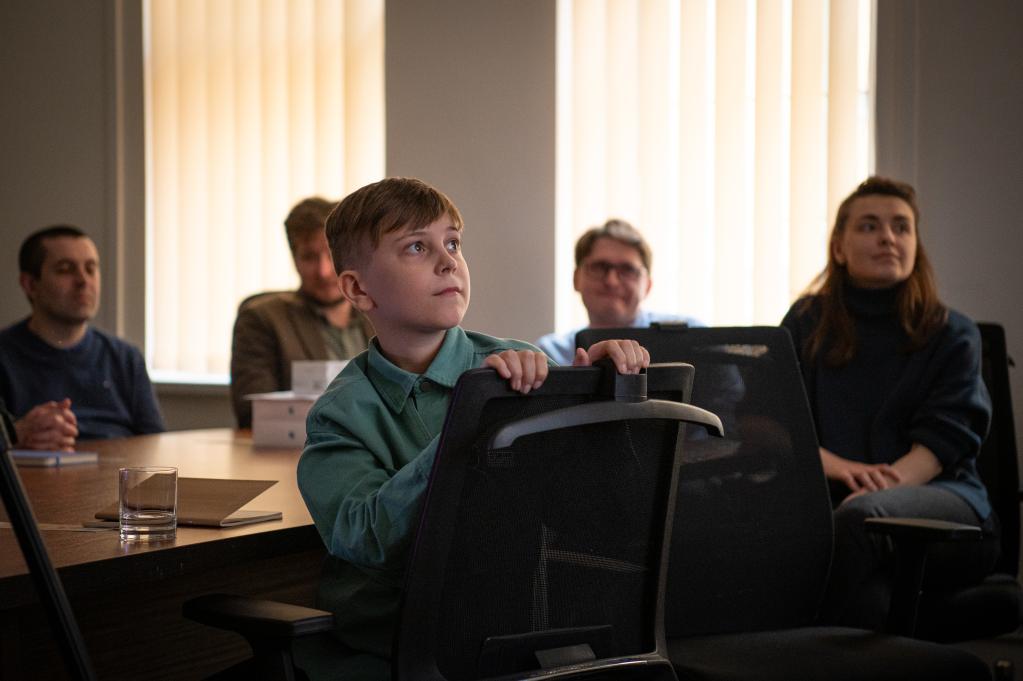
Press Release
25 April 2024
The Head of the UN in Ukraine, Denise Brown, meets in Kyiv the Minister for Foreign Trade and Development of Finland, Ville Tavio
Finland has consistently provided funding for humanitarian response in Ukraine since the escalation of the war two years ago, including through the Ukraine Humanitarian Fund and supported projects in mine action, education and energy infrastructure, among others. Denise Brown thanked the Minister for all contributions and highlighted the need for more support on community recovery in some regions of Ukraine.
1 of 5
Press Release
19 April 2024
THERE IS NO PEACEFUL MORNING IN UKRAINE
I vehemently condemn the attacks by the Armed Forces of the Russian Federation, which today hit Dnipro City and other parts of the Dnipro Region, east of Ukraine, bringing new suffering to the people of Ukraine. Strikes occurred today's early morning, damaging homes and killing and injuring dozens of people. This came just two days after a deadly attack in Chernihiv City, north of the country, and once again, there are reports that children were among those killed. Aid workers in Dnipro are already on the ground, helping the affected people. The attacks are yet another example of a grave and reprehensible disregard for human life. International Humanitarian Law protects civilians and civilian infrastructure.
1 of 5
Press Release
15 April 2024
SAUDI ARABIA SUPPORTS 140,000 UKRAINIANS WITH HOT MEALS THROUGH THE UN WORLD FOOD PROGRAMME
The agreement was signed between HE Dr Abdullah Al Rabeeah, Royal Court Advisor and Supervisor General of KSRelief, and WFP Executive Director Cindy McCain. Saudi Arabia’s donation will help provide 50 million meals for residents in institutions supported by WFP, such as hospitals, shelters for internally displaced persons, orphanages, psychiatric and geriatric facilities, and other public or private organizations caring for the most vulnerable Ukrainians. Many of these institutions have faced increased strain and budget shortfalls because of the war and massive internal displacement.“We’re grateful that KSrelief chose to support a vital component of our emergency programmes in Ukraine- which provides relief to the most vulnerable Ukrainians while also strengthening the local institutions and organizations that care for them,” said WFP Country Director a.i. in Ukraine, Marianne Ward."We are pleased to be part of this important emergency programme to respond to the urgent humanitarian needs of the affected population in Ukraine. KSrelief humanitarian assistance will provide lifesaving food assistance to the most vulnerable communities throughout the country," said Engineer Ahmed Al Baiz, KSrelief's Assistant Supervisor General of Planning and Development.The contribution will enable WFP to procure and deliver approximately 7,600 metric tons of food commodities, including flour, pasta, buckwheat, oatmeal, peas, sugar, and oil – all of which are bought inside Ukraine to support the local economy and food systems. These commodities are then complemented by other foods bought directly by the institutions to prepare nutritious daily meals for residents and people under their care.Over the next six months, WFP plans to provide food assistance to 210,000 vulnerable Ukrainians through its institutional feeding programme. The contribution from KSrelief will cover a significant portion, approximately 67 percent, of the programme's needs - supporting 140,000 Ukrainians.In the last year WFP’s institutional feeding programme supported 460,000 Ukrainians in Cherkasy, Chernihiv, Chernivtsi, Dnipropetrovsk, Donetsk, Ivano-Frankivsk, Kharkiv, Kherson, Khmelnytskyi, Kirovohrad, Kyiv, Lviv, Mykolaiv, Odesa, Poltava, Rivne, Sumy, Ternopil, Vinnytsia, Volyn, Zakarpattia, Zaporizhzhia, and Zhytomyr oblasts of Ukraine. Institutional feeding is one of many ways WFP supports Ukrainians affected by the war- WFP also distributes food boxes in areas closest to the frontline, where food is hard to find or very expensive, distributes cash assistance to vulnerable Ukrainians across the country, and is supporting the safe release of mined agricultural land in the Kharkiv region to help farmers and food producers resume work. WFP also chartered 25 vessels to export Ukrainian grain to countries in need through the Black Sea Grain Initiative and the Grain From Ukraine initiative. # # #The United Nations World Food Programme is the world’s largest humanitarian organization, saving lives in emergencies and using food assistance to build a pathway to peace, stability and prosperity for people recovering from conflict, disasters and the impact of climate change. Twitter @wfp_media, @GccWfp For more information please contact: Antoine Vallas/ WFP Kyiv, +380952501154, antoine.vallas@wfp.orgAbeer Etefa, WFP/ Cairo, +20106 663 4352 abeer.etefa@wfp.orgZeina Habib/WFP Gulf, +971 52 4724971, zeina.habib@wfp.org
1 of 5
Press Release
08 April 2024
JOINT STATEMENT BY THE INTERNATIONAL COORDINATION ROMA GROUP AND THE UNITED NATIONS IN UKRAINE ON THE OCCASION OF INTERNATIONAL ROMA DAY
Today, on International Roma Day, the International Coordination Roma Group and the United Nations in Ukraine join communities across the world to celebrate Roma culture, history and language, and to draw attention to the challenges Roma people are faced with in their daily lives. On this day, we would like to share our solidarity and support Roma communities in combating stereotypes and deep-rooted discrimination, many times exacerbated by multiple and combined forms of prejudices, such as those faced by Roma women and Roma who have been displaced because of Russia’s invasion. We also want to pay tribute to Roma leaders who are promoting Romani identity and protecting Roma rights. Across Ukraine, Roma activists, most often women, have taken on leadership roles to ensure humanitarian response reaches all those impacted by the war and are making remarkable contributions towards social cohesion.Regrettably, Roma people still often face stigmatization, hate speech and prejudice, which not only violate their dignity and rights but severely hamper their access to essential services, including health, education, documentation, housing, education and public utilities. Young Roma women are especially vulnerable, and face heightened risks of violence and abuse, including gender-based violence and child marriage. Russia's invasion of Ukraine has exacerbated these pre-existing problems and challenges faced by Roma communities. Nevertheless, Roma are an important part of Ukrainian society and the country's rich multicultural historical heritage. Therefore, it is extremely important to ensure equal rights to all, ensure that no one will be left behind, and that Roma’s specific needs and challenges are taken into consideration. Roma civil society, and especially women-led organizations, is now well placed to cooperate with local and regional authorities as they embark on ambitious plans for community-level early recovery and durable solutions to ensure people can take back their lives and recover from the devastation caused by Russia’s war on Ukraine. To this end, we proudly support the work of Roma mediators and civil society organizations who have worked hard and effectively to reach the most discriminated Roma communities to support their empowerment, and access to rights and services. We welcome the adoption of the National Strategy for Roma Inclusion and the National Action Plan for Roma, calling for the full implementation and development of related local Action Plans. It must be a priority for authorities at all levels to support the meaningful and effective participation of Roma communities in decision-making on gender-responsive and inclusive recovery. These policy instruments are essential to place Roma inclusion high on the Ukrainian agenda and to support Ukraine's accession to the European Union.The ICRG and the United Nations in Ukraine are committed to continuing to support and facilitate such initiatives and efforts that are in line with European and international human rights standards.Opre Roma! Bahtalo Internacionalno Romano dives tumenge! *** Note to editors:The International Coordination Roma Group, coordinated by the Council of Europe in Ukraine (CoE), is composed of UN agencies in Ukraine, including UNICEF, the UN Refugee Agency (UNHCR), the United Nations Development Programme (UNDP), and UN WOMEN; the World Bank; the European Commission. The United Nations Country Team in Ukraine is composed of over 20 agencies and offices. For more information, please contact:United Nations in UkraineSaviano Abreu, Spokesperson, deabreuisidoro@un.org, +380 50 422 3943
1 of 5
Press Release
06 April 2024
CIVILIANS, AID WORKERS AND FIRST RESPONDERS HELPING WAR-AFFECTED CIVILIANS MUST BE PROTECTED
Not a day passes by without strikes by the Armed Forces of the Russian Federation, crushing the lives of people across Ukraine. Yesterday and today, dozens of civilians in Kharkiv and Zaporizhzhia were, once again, killed or injured. And once again, first responders who rushed to help were also affected by a series of strikes. It is unacceptable that places which are designated to help people in need – centres where those who have fled their homes live and receive support, or offices of aid organizations – are hit, hampering access to humanitarian assistance for those who depend on it.I condemn this apparent pattern of continued attacks impacting civilians and civilian infrastructure. Civilians, aid workers and first responders helping war-affected civilians must be protected. International humanitarian law must be respected.
1 of 5
Latest Resources
1 / 11
Resources
26 March 2024
Resources
22 March 2024
Resources
21 February 2024
1 / 11

